March of the Machine: The Aftermath Release Notes
Compiled by Matt Tabak and Jess Dunks
Document last modified January 31, 2023
PDF Download Links:
English | 中国话,汉语;中文 | Français | Deutsch
Italiano | Português | Español | 日本語
The Release Notes include information concerning the release of a new Magic: The Gathering set, as well as a collection of clarifications and rulings involving that set's cards. It's intended to make playing with the new cards more fun by clearing up the common misconceptions and confusion inevitably caused by new mechanics and interactions. As future sets are released, updates to the Magic rules may cause some of this information to become outdated. Go to Magic.Wizards.com/Rules to find the most up-to-date rules.
The "General Notes" section includes information about card legality and explains some of the mechanics and concepts in the set.
The "Card-Specific Notes" sections contain answers to the most important, most common, and most confusing questions players might ask about cards in the set. Items in the "Card-Specific Notes" sections include full card text for your reference. Not all cards in the set are listed.
GENERAL NOTES
Card Legality
March of the Machine: The Aftermath cards with the MAT set code are permitted in the Standard, Pioneer, and Modern formats, as well as in Commander and other formats. At release, the following card sets will be permitted in the Standard format: Innistrad: Midnight Hunt, Innistrad: Crimson Vow, Kamigawa: Neon Dynasty, Streets of New Capenna, Dominaria United, The Brothers' War, Phyrexia: All Will Be One, March of the Machine, and March of the Machine: The Aftermath.
Go to Magic.Wizards.com/Formats for a complete list of formats and their permitted card sets and banned lists.
Go to Magic.Wizards.com/Commander for more information on the Commander variant.
Go to Locator.Wizards.com to find an event or store near you.
MARCH OF THE MACHINE EPILOGUE CARD-SPECIFIC NOTES
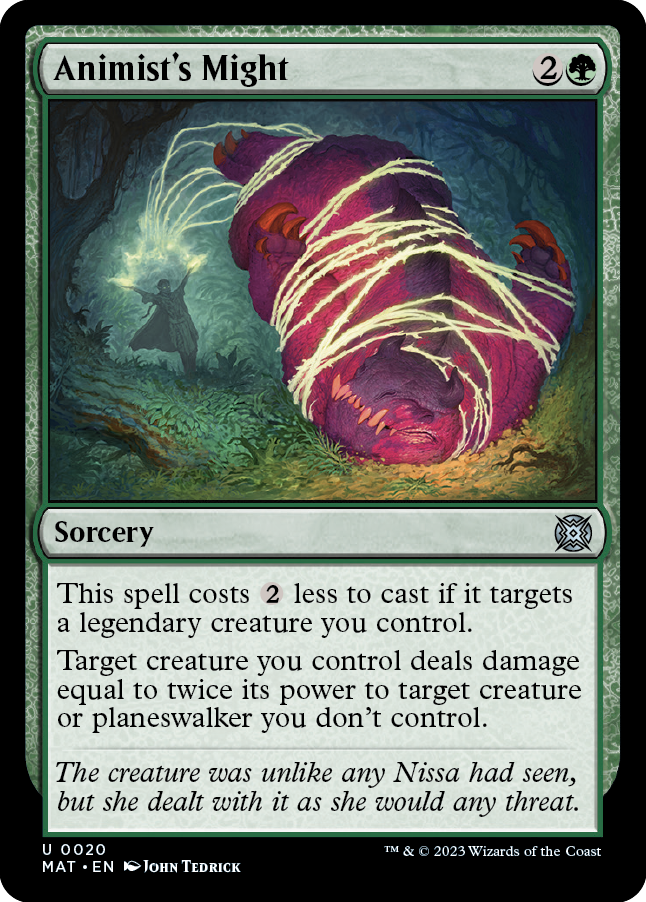
Animist's Might
{2}{G}
Sorcery
This spell costs {2} less to cast if it targets a legendary creature you control.
Target creature you control deals damage equal to twice its power to target creature or planeswalker you don't control.
- The cost-reduction ability of Animist's Might doesn't change its mana cost or mana value, only the total cost you pay. Specifically, the mana value of Animist's Might is always 3.
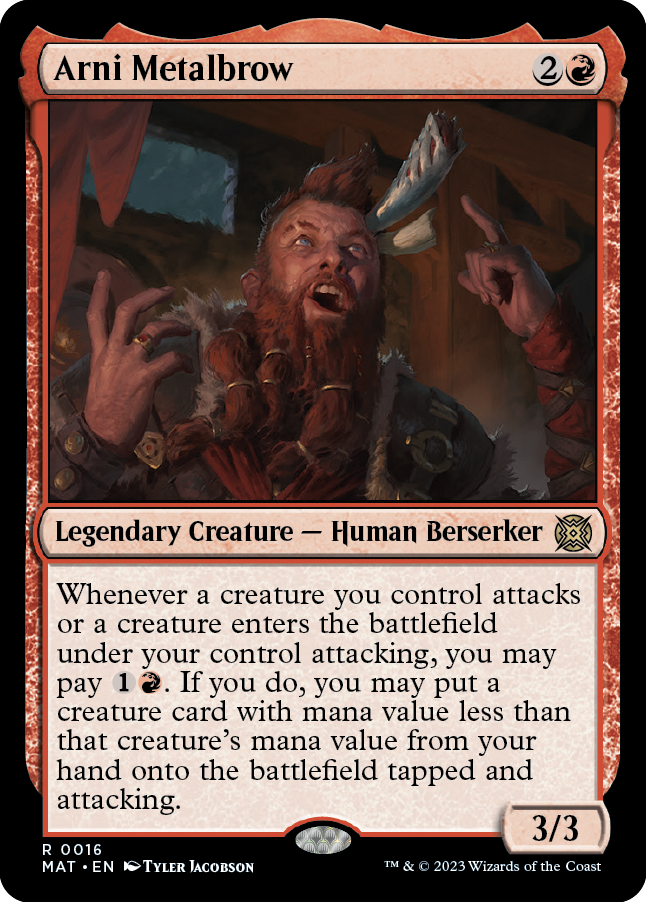
Arni Metalbrow
{2}{R}
Legendary Creature — Human Berserker
3/3
Whenever a creature you control attacks or a creature enters the battlefield under your control attacking, you may pay {1}{R}. If you do, you may put a creature card with mana value less than that creature's mana value from your hand onto the battlefield tapped and attacking.
- You decide whether to pay {1}{R} as the triggered ability resolves.
- Putting a creature onto the battlefield attacking as the ability resolves will cause the ability to trigger again. This instance of the ability will consider the mana value of the new creature that entered the battlefield attacking.
- If the attacking creature or creature that entered the battlefield attacking isn't on the battlefield as the triggered ability resolves, use its mana value from when it was last on the battlefield. (If it's on the battlefield but is no longer attacking, use its current mana value.)
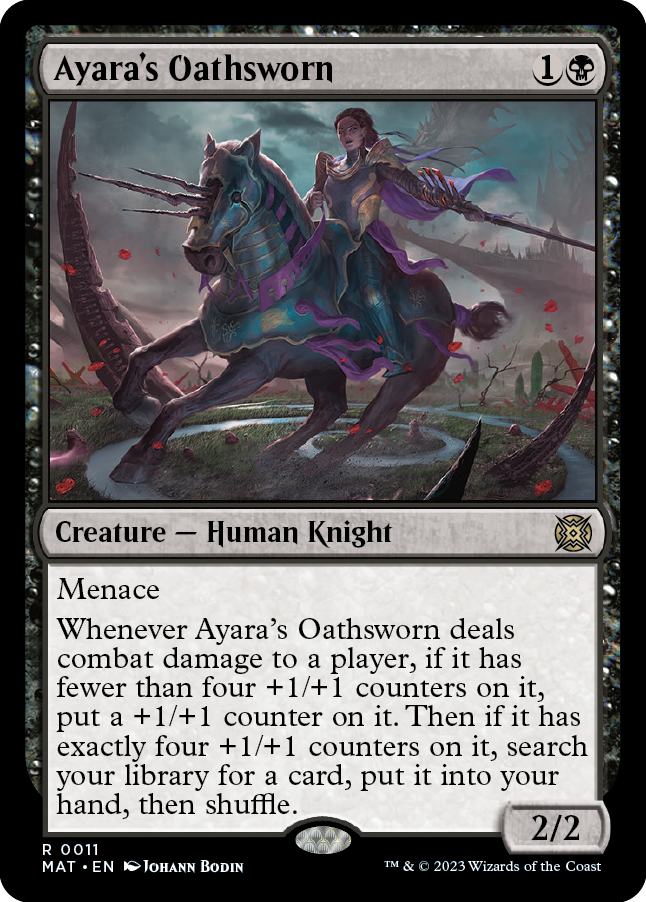
Ayara's Oathsworn
{1}{B}
Creature — Human Knight
2/2
Menace
Whenever Ayara's Oathsworn deals combat damage to a player, if it has fewer than four +1/+1 counters on it, put a +1/+1 counter on it. Then if it has exactly four +1/+1 counters on it, search your library for a card, put it into your hand, then shuffle.
- If Ayara's Oathsworn has four or more +1/+1 counters on it as it deals combat damage to a player, its ability won't trigger at all. None of its effects will happen. You won't put a +1/+1 counter on Ayara's Oathsworn and you won't search for a card.
- If the triggered ability does trigger, that ability will check Ayara's Oathsworn again as it tries to resolve. If Ayara's Oathsworn has four or more +1/+1 counters on it at that time, the ability won't resolve. None of its effects will happen. You won't put a +1/+1 counter on Ayara's Oathsworn and you won't search for a card.
- If Ayara's Oathsworn isn't on the battlefield as its ability tries to resolve, you won't search for a card, even if Ayara's Oathsworn had three +1/+1 counters on it before if left the battlefield, because it won't be around to have the fourth +1/+1 counter put on it.
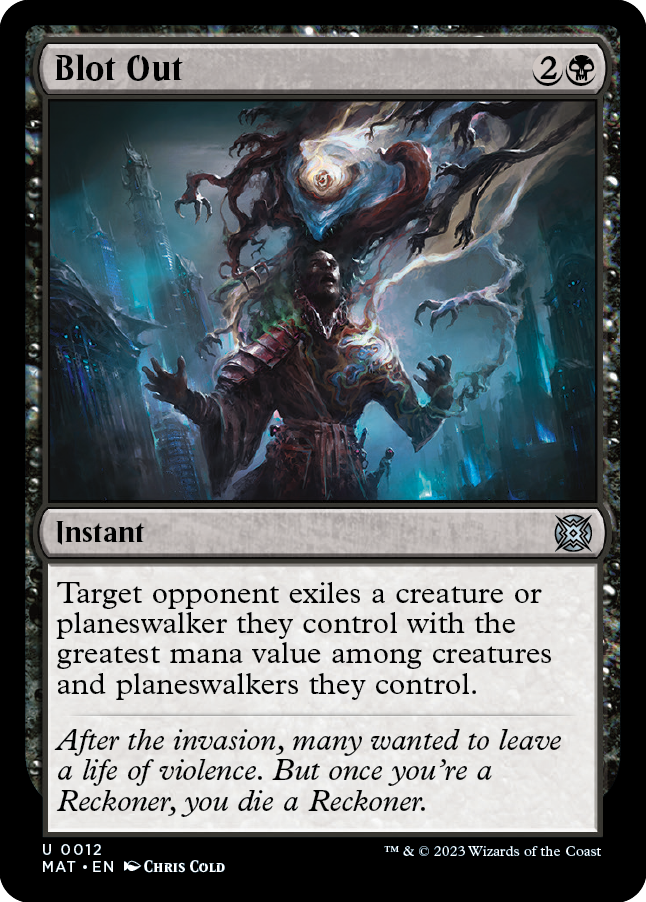
Blot Out
{2}{B}
Instant
Target opponent exiles a creature or planeswalker they control with the greatest mana value among creatures and planeswalkers they control.
- Which creature or planeswalker will be exiled is determined as Blot Out resolves.
- Blot Out targets only the opponent, not any permanent. A permanent with hexproof may be exiled this way if its mana value is the greatest, for example.
- Consider all creatures and planeswalkers the target opponent controls as one group to see which one has the greatest mana value. For example, if the opponent controls a creature with mana value 3 and a planeswalker with mana value 5, they must exile the planeswalker.
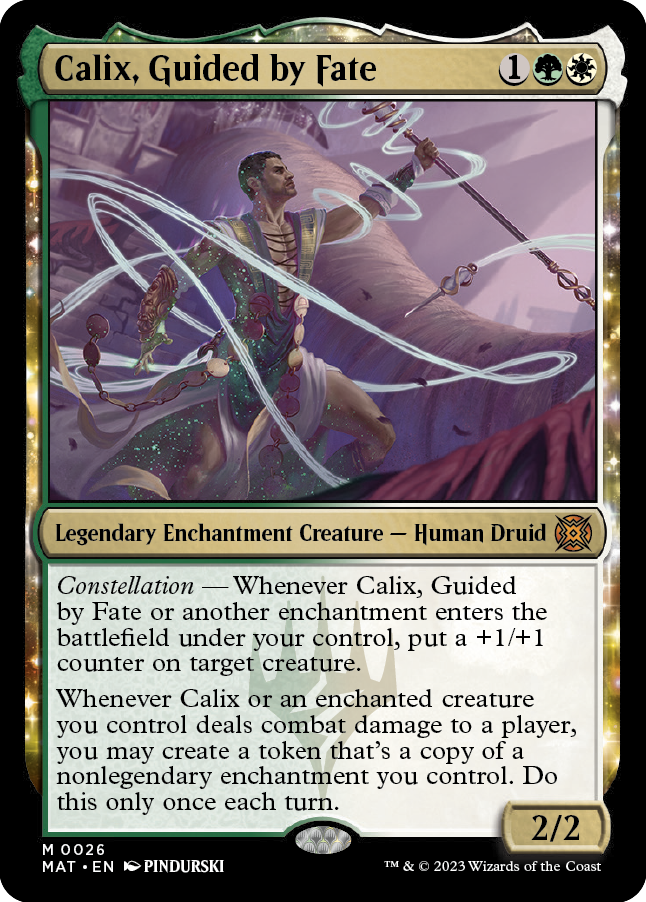
Calix, Guided by Fate
{1}{G}{W}
Legendary Enchantment Creature — Human Druid
2/2
Constellation — Whenever Calix, Guided by Fate or another enchantment enters the battlefield under your control, put a +1/+1 counter on target creature.
Whenever Calix or an enchanted creature you control deals combat damage to a player, you may create a token that's a copy of a nonlegendary enchantment you control. Do this only once each turn.
- Calix may be the target of its own constellation ability. This includes when Calix itself enters the battlefield.
- Calix's last ability doesn't target any permanent. You choose which nonlegendary enchantment you control you're creating a token copy of, if any, as the ability resolves. No player may take any actions between your choice and the creation of the token.
- Once you choose to create a token using the last ability, that ability won't trigger again that turn. Additional instances of the ability that are already on the stack will resolve but will have no effect.
- The token copies exactly what was printed on the original permanent and nothing else (unless that permanent is copying something else or is a token; see below). It doesn't copy whether that permanent is tapped or untapped, whether it has any counters on it or Auras and Equipment attached to it, or any non-copy effects that have changed its power, toughness, types, color, and so on.
- If the copied permanent has {X} in its mana cost, X is 0.
- If the copied permanent is a token, the token that's created copies the original characteristics of that token as stated by the effect that created that token.
- If the copied permanent is copying something else, then the token enters the battlefield as whatever that permanent copied.
- Any enters-the-battlefield abilities of the copied permanent will trigger when the token enters the battlefield. Any "as [this permanent] enters the battlefield" or "[this permanent] enters the battlefield with" abilities of the copied permanent will also work.
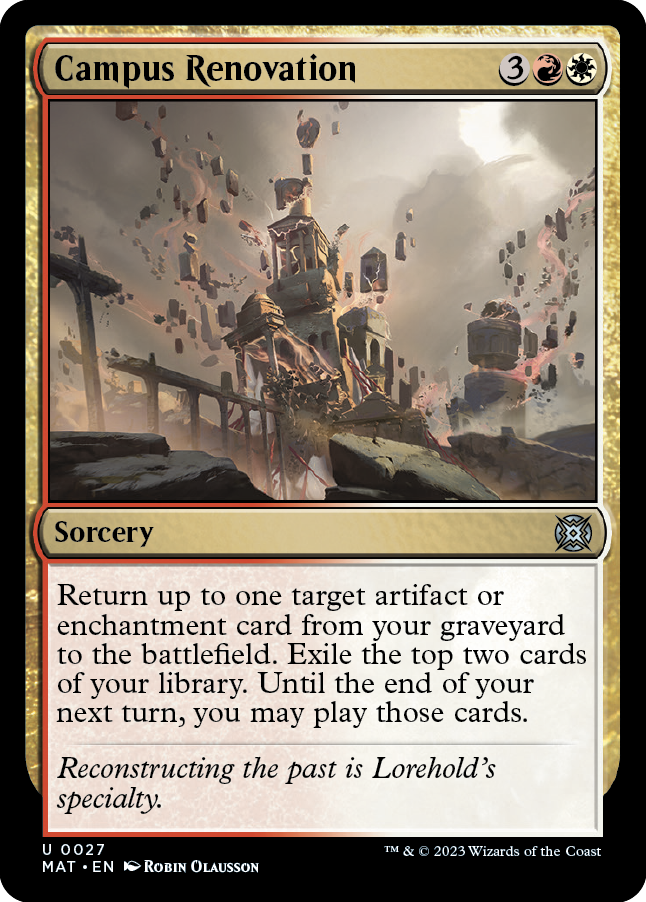
Campus Renovation
{3}{R}{W}
Sorcery
Return up to one target artifact or enchantment card from your graveyard to the battlefield. Exile the top two cards of your library. Until the end of your next turn, you may play those cards.
- You don't have to choose a target artifact or enchantment card to cast Campus Renovation. However, if you do, and that card is an illegal target at the time Campus Renovation tries to resolve, it won't resolve and none of its effects will happen. You won't exile any cards from your library.
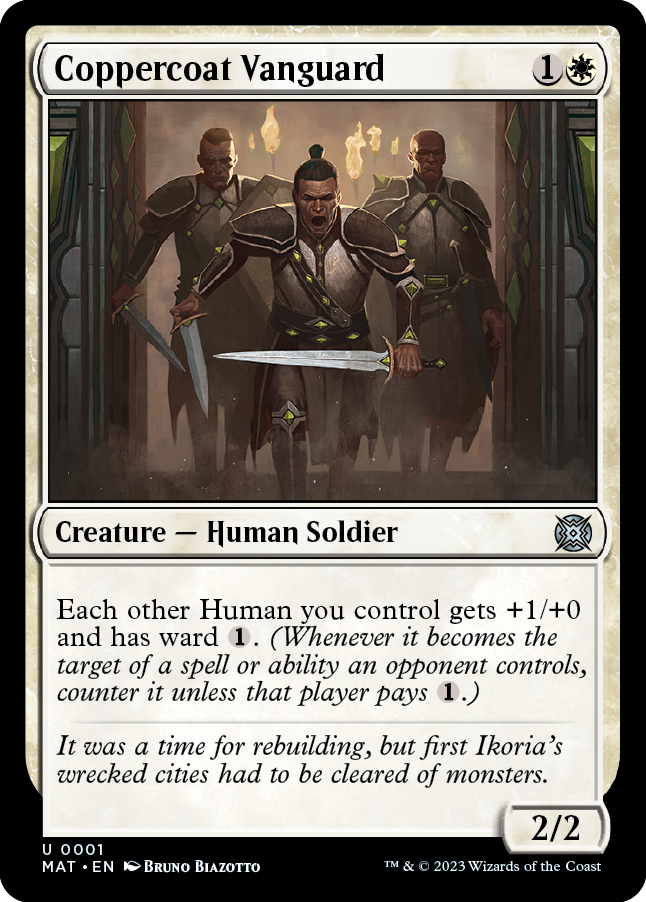
Coppercoat Vanguard
{1}{W}
Creature — Human Soldier
2/2
Each other Human you control gets +1/+0 and has ward {1}. (Whenever it becomes the target of a spell or ability an opponent controls, counter it unless that player pays {1}.)
- Once a ward ability has triggered, causing that Human to lose ward by removing Coppercoat Vanguard won't affect that ability. The appropriate player will still have to pay {1} or see their spell or ability countered.
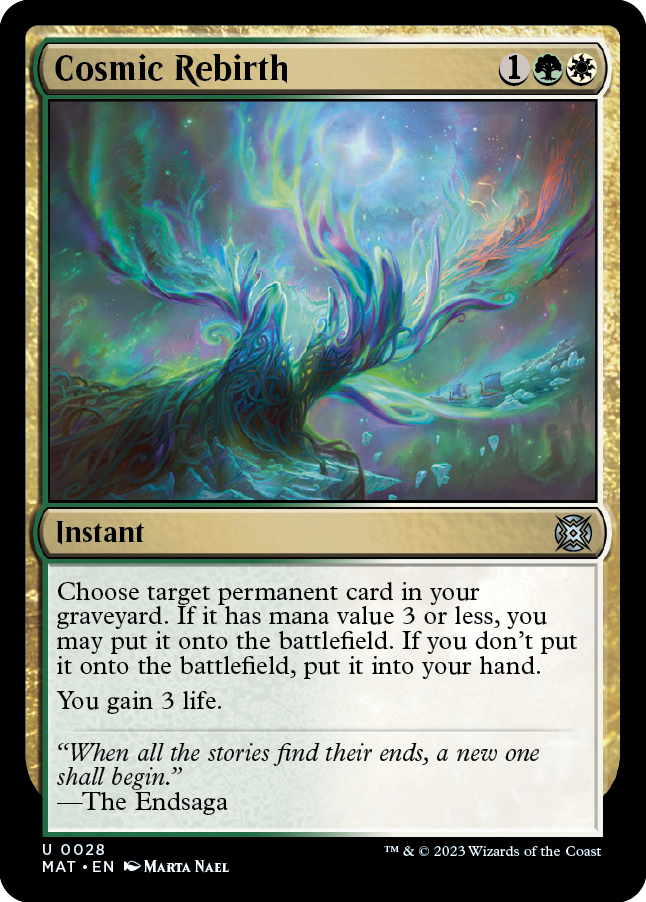
Cosmic Rebirth
{1}{G}{W}
Instant
Choose target permanent card in your graveyard. If it has mana value 3 or less, you may put it onto the battlefield. If you don't put it onto the battlefield, put it into your hand.
You gain 3 life.
- You put the card into your hand if you didn't put it onto the battlefield because you chose not to or because its mana value was 4 or greater.
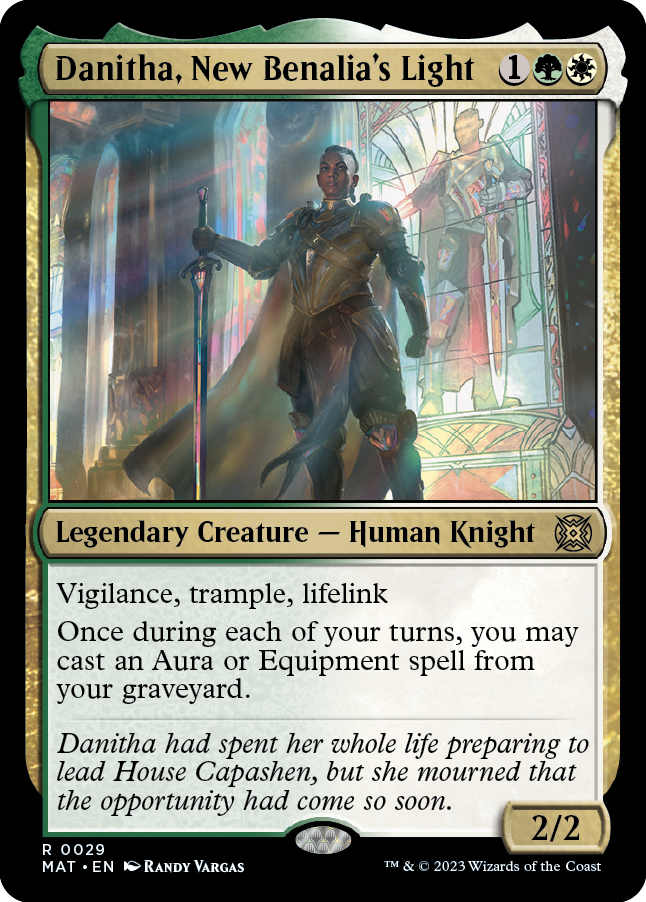
Danitha, New Benalia's Light
{1}{G}{W}
Legendary Creature — Human Knight
2/2
Vigilance, trample, lifelink
Once during each of your turns, you may cast an Aura or Equipment spell from your graveyard.
- You must follow the normal timing permissions and restrictions of the spell you cast from your graveyard.
- You must pay the costs to cast that spell. If it has an alternative cost, you may cast it for that cost instead.
- Once you begin to cast the spell, losing control of Danitha won't affect the spell.
- If you cast a spell from your graveyard using another permission, Danitha's effect doesn't apply. You can cast another Aura or Equipment spell from your graveyard.
- If you cast one Aura or Equipment spell from your graveyard and then have a new Danitha come under your control in the same turn, you may cast another Aura or Equipment spell from your graveyard that turn.
- If an Aura or Equipment card is put into your graveyard during your main phase and the stack is empty, you have a chance to cast it before any player may attempt to remove that card from your graveyard.
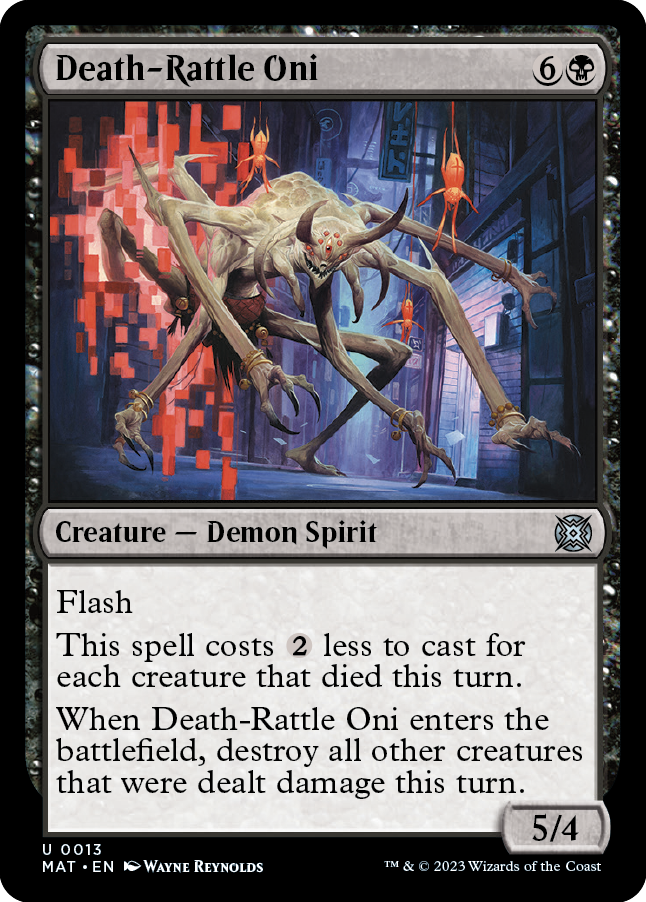
Death-Rattle Oni
{6}{B}
Creature — Demon Spirit
5/4
Flash
This spell costs {2} less to cast for each creature that died this turn.
When Death-Rattle Oni enters the battlefield, destroy all other creatures that were dealt damage this turn.
- The cost-reduction ability of Death-Rattle Oni doesn't change its mana cost or mana value, only the total cost you pay. Specifically, Death-Rattle Oni's mana value is always 7.
- Count any creature that died during the turn, including token creatures, when calculating the cost reduction. For nontoken creatures that died, it doesn't matter what happened to the creature cards after they died.
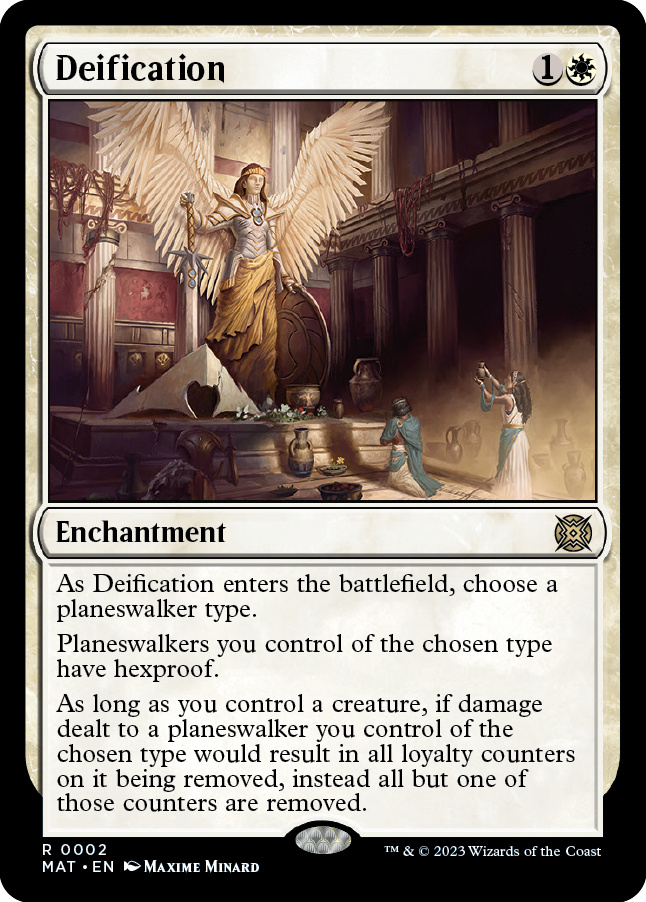
Deification
{1}{W}
Enchantment
As Deification enters the battlefield, choose a planeswalker type.
Planeswalkers you control of the chosen type have hexproof.
As long as you control a creature, if damage dealt to a planeswalker you control of the chosen type would result in all loyalty counters on it being removed, instead all but one of those counters are removed.
- A planeswalker with hexproof may still be attacked.
- Deification's last ability doesn't prevent damage. All damage is still dealt to the affected planeswalkers, and any additional effects of that damage will still happen. For example, if a 3/3 creature with lifelink attacks an affected planeswalker with two loyalty counters on it, 3 damage will be dealt, causing the controller of the creature to gain 3 life and one loyalty counter to be removed from the planeswalker.
- Deification's last ability will apply to a planeswalker dealt combat damage in the same combat damage step that its controller's last creature is destroyed.
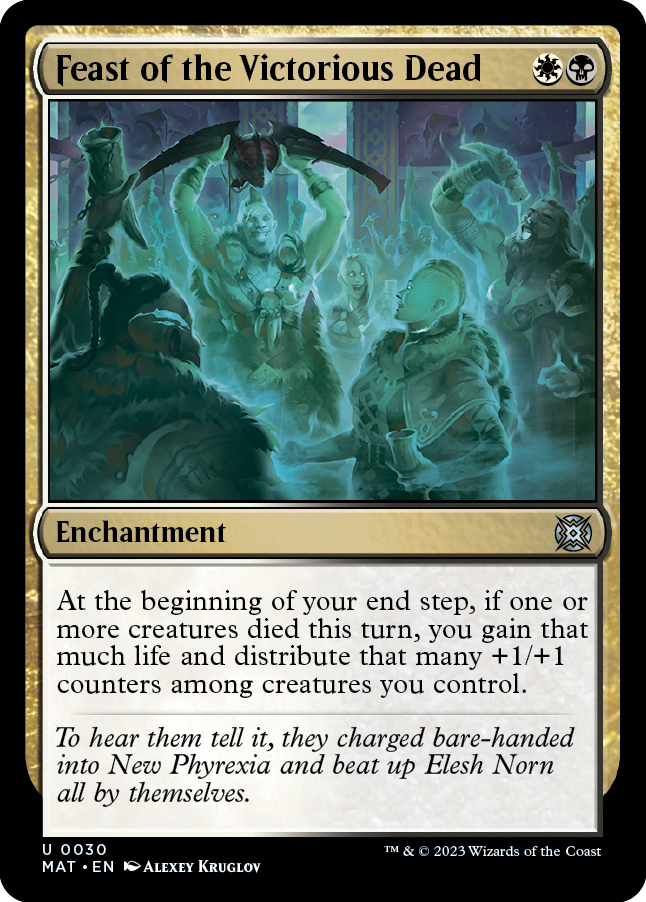
Feast of the Victorious Dead
{W}{B}
Enchantment
At the beginning of your end step, if one or more creatures died this turn, you gain that much life and distribute that many +1/+1 counters among creatures you control.
- If no creatures have died by the time your end step begins, the ability of Feast of the Victorious Dead won't trigger at all. Provided the ability does trigger, it will count the number of creatures that have died as the ability resolves. In other words, creatures that die in response to the ability will count as long as at least one died previously to have the ability trigger in the first place.
- The ability will count any creature that died, including token creatures. For nontoken creatures that died, it doesn't matter if the cards are still in the graveyard.
- The ability doesn't target any creatures. You choose how the counters are distributed as the ability resolves.
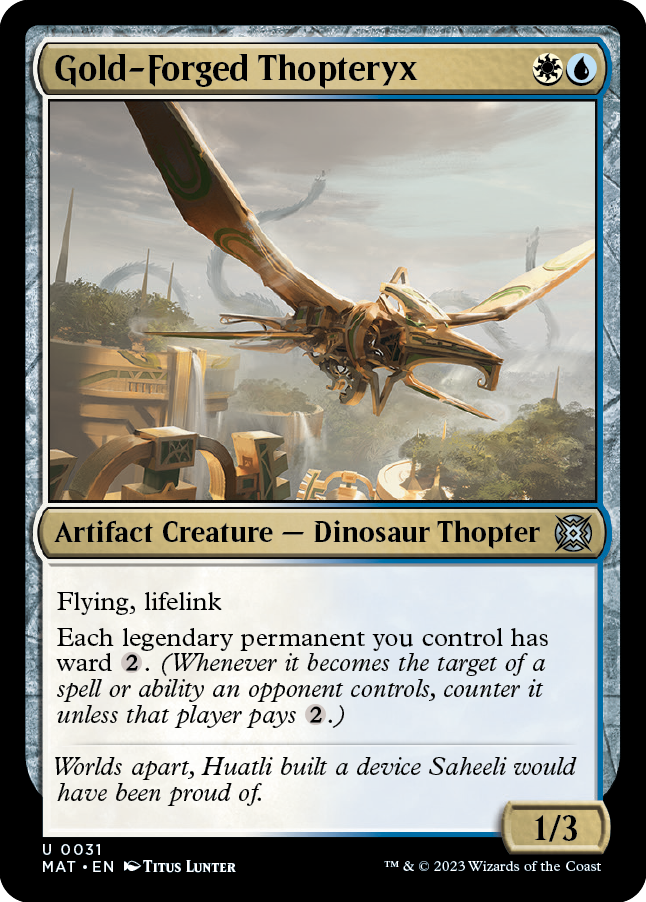
Gold-Forged Thopteryx
{W}{U}
Artifact Creature — Dinosaur Thopter
1/3
Flying, lifelink
Each legendary permanent you control has ward {2}. (Whenever it becomes the target of a spell or ability an opponent controls, counter it unless that player pays {2}.)
- Once a ward ability has triggered, causing that legendary permanent to lose ward by removing Gold-Forged Thopteryx won't affect that ability. The appropriate player will still have to pay {2} or see their spell or ability countered.
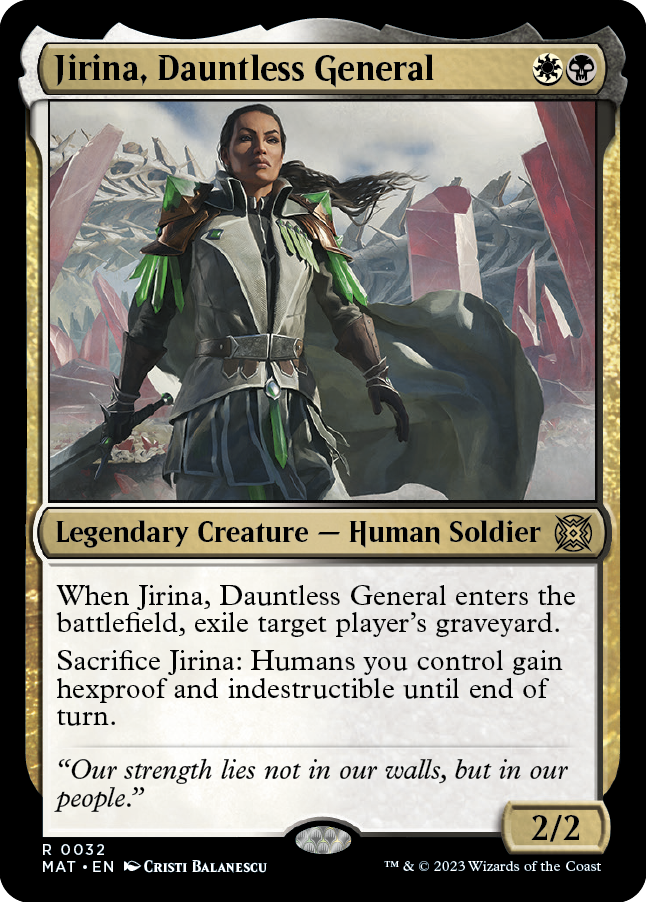
Jirina, Dauntless General
{W}{B}
Legendary Creature — Human Soldier
2/2
When Jirina, Dauntless General enters the battlefield, exile target player's graveyard.
Sacrifice Jirina: Humans you control gain hexproof and indestructible until end of turn.
- The set of creatures affected by Jirina's last ability is determined as the ability resolves. Humans you begin to control later in the turn, non-Human creatures you control that become Human, and noncreature permanents that become Human creatures later in the turn won't gain hexproof and indestructible.
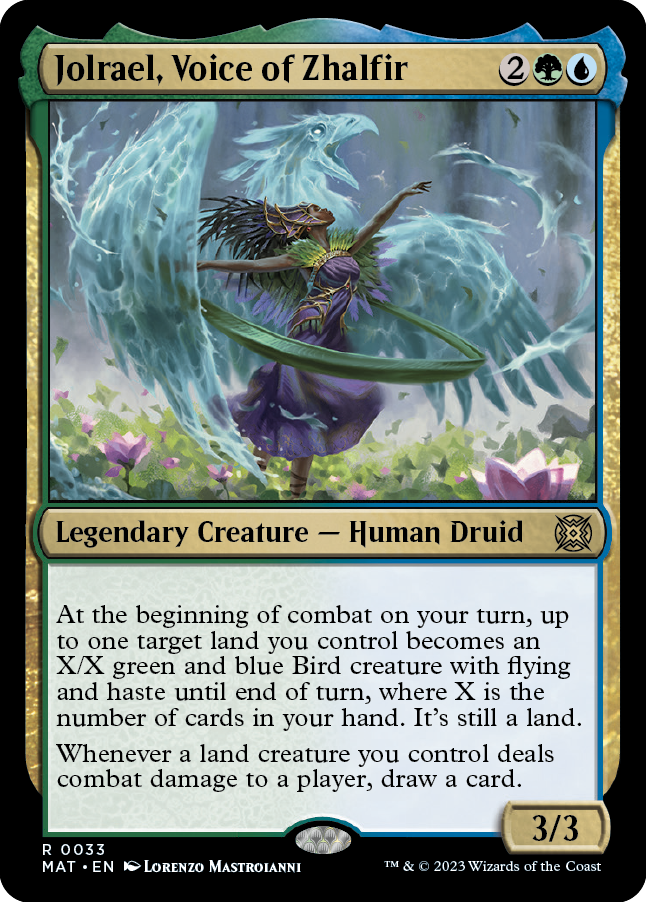
Jolrael, Voice of Zhalfir
{2}{G}{U}
Legendary Creature — Human Druid
3/3
At the beginning of combat on your turn, up to one target land you control becomes an X/X green and blue Bird creature with flying and haste until end of turn, where X is the number of cards in your hand. It's still a land.
Whenever a land creature you control deals combat damage to a player, draw a card.
- Use the number of cards in your hand as Jolrael's first ability resolves to determine the value of X. Once the ability resolves, that value is locked in. The power and toughness of the land creature won't change if the number of cards in your hand changes later in the turn.
- Jolrael's last ability applies to any land creature you control that deals combat damage to a player, not only lands that become land creatures because of Jolrael's first ability.
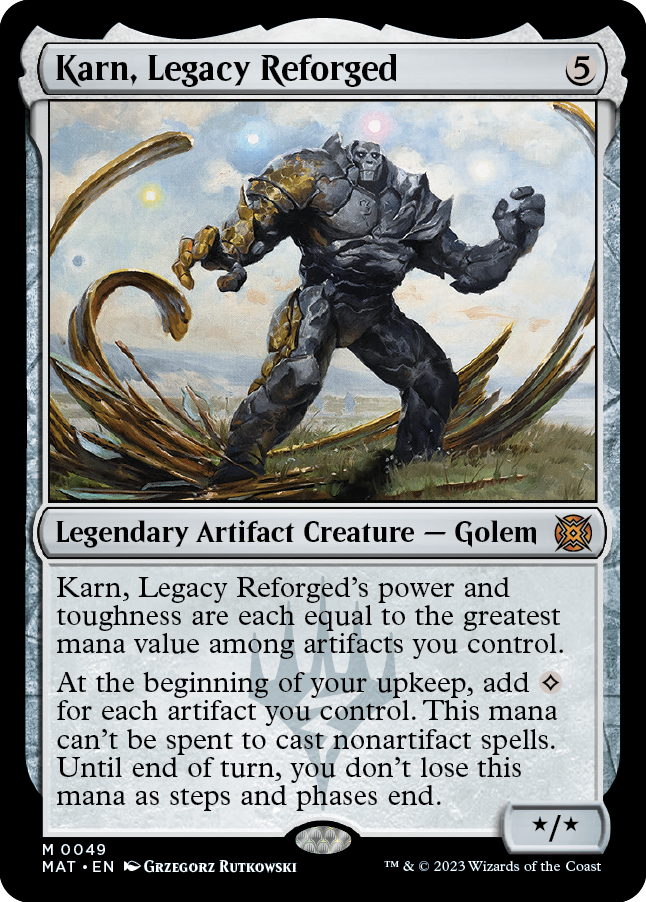
Karn, Legacy Reforged
{5}
Legendary Artifact Creature — Golem
*/*
Karn, Legacy Reforged's power and toughness are each equal to the greatest mana value among artifacts you control.
At the beginning of your upkeep, add {C} for each artifact you control. This mana can't be spent to cast nonartifact spells. Until end of turn, you don't lose this mana as steps and phases end.
- The ability that defines Karn's power and toughness works in all zones, not just the battlefield. As long as Karn is under your control and still an artifact, its own mana value will count. In most cases, it'll be at least 5/5.
- Karn's last ability isn't a mana ability, even though it adds mana. It uses the stack and it can be responded to. Use the number of artifacts you control as the ability resolves to determine how much mana to add.
- The mana produced by Karn's last ability can be spent on anything that isn't a nonartifact spell. This includes casting artifact spells, paying costs to activate abilities of both artifact and nonartifact permanents, paying ward costs, and so on.
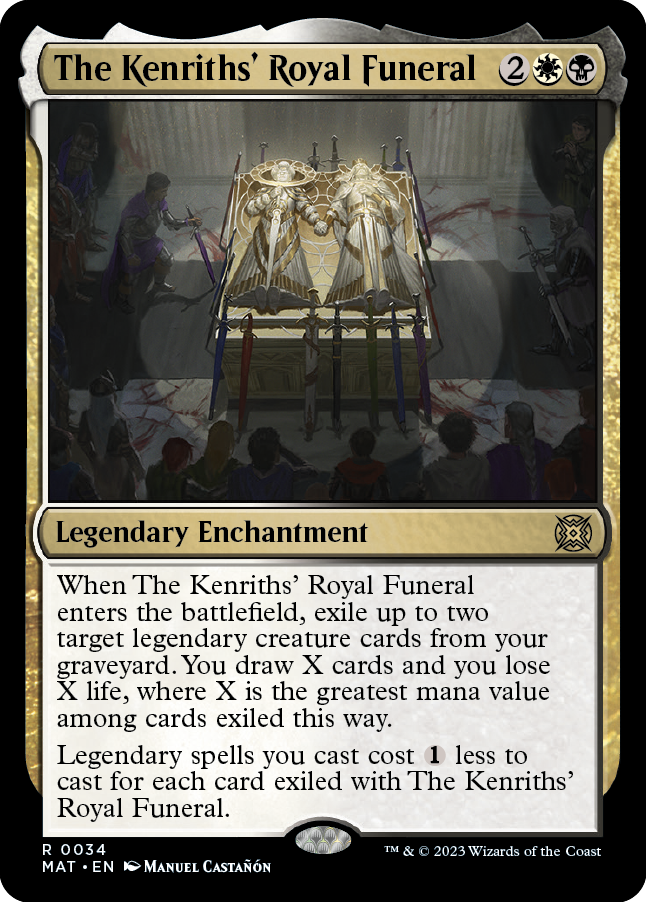
The Kenriths' Royal Funeral
{2}{W}{B}
Legendary Enchantment
When The Kenriths' Royal Funeral enters the battlefield, exile up to two target legendary creature cards from your graveyard. You draw X cards and you lose X life, where X is the greatest mana value among cards exiled this way.
Legendary spells you cast cost {1} less to cast for each card exiled with The Kenriths' Royal Funeral.
- The last ability doesn't change the mana cost or mana value of any legendary spell you cast, only the total cost you pay.
- Any of the exiled cards that somehow leave exile will no longer count toward the discount offered by the last ability.
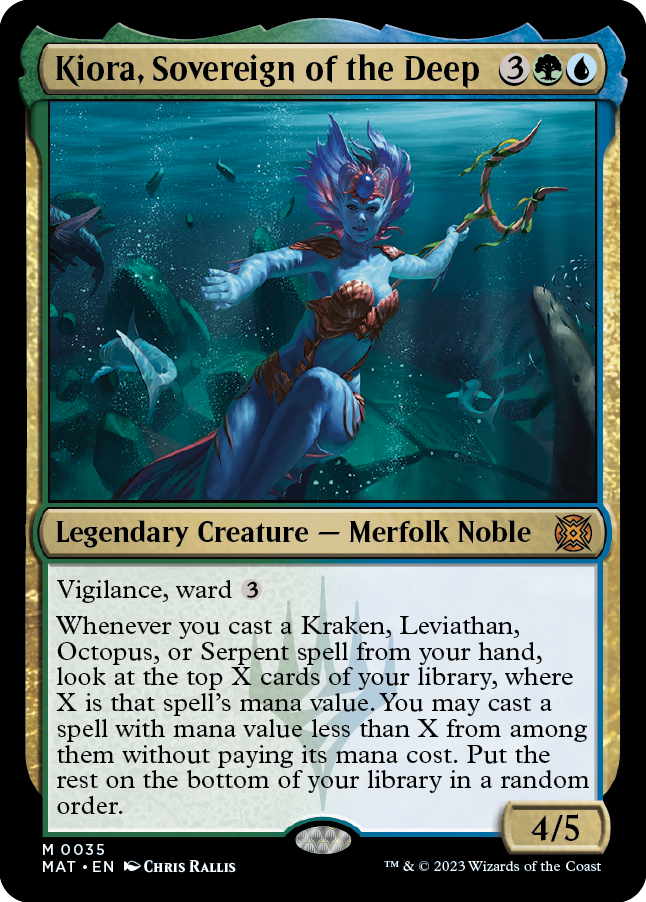
Kiora, Sovereign of the Deep
{3}{G}{U}
Legendary Creature — Merfolk Noble
4/5
Vigilance, ward {3}
Whenever you cast a Kraken, Leviathan, Octopus, or Serpent spell from your hand, look at the top X cards of your library, where X is that spell's mana value. You may cast a spell with mana value less than X from among them without paying its mana cost. Put the rest on the bottom of your library in a random order.
- The spell you cast without paying its mana cost is cast during the resolution of the triggered ability. Timing restrictions of that spell based on card type are ignored. It will resolve before the spell that caused the ability to trigger.
- If you cast a spell "without paying its mana cost," you can't pay any alternative costs. You can, however, pay additional costs. If the spell has any mandatory additional costs, those must be paid to cast it.
- If the spell has {X} in its mana cost, you must choose 0 as the value of X when casting it without paying its mana cost.
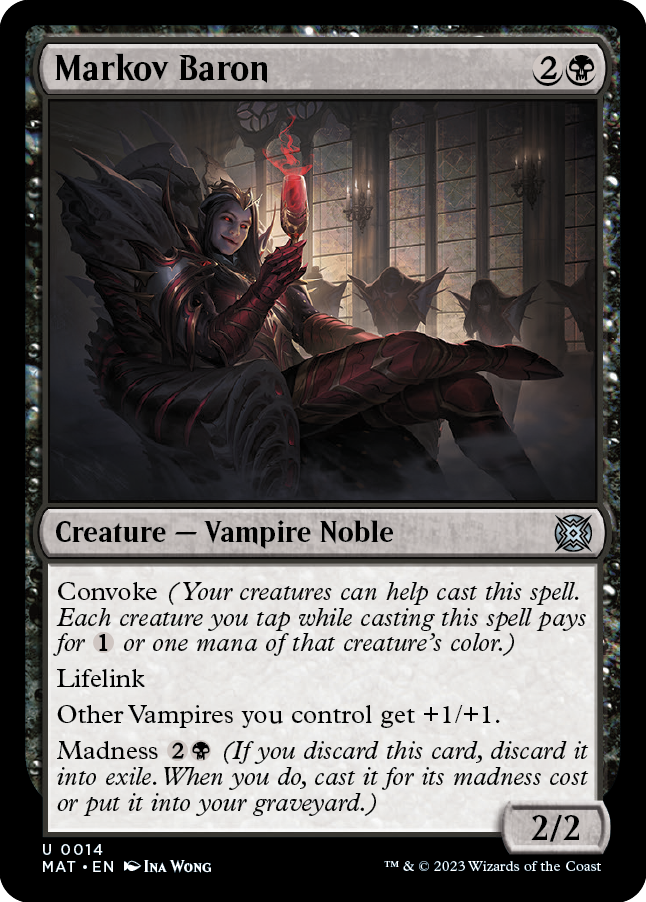
Markov Baron
{2}{B}
Creature — Vampire Noble
2/2
Convoke (Your creatures can help cast this spell. Each creature you tap while casting this spell pays for {1} or one mana of that creature's color.)
Lifelink
Other Vampires you control get +1/+1.
Madness {2}{B} (If you discard this card, discard it into exile. When you do, cast it for its madness cost or put it into your graveyard.)
Madness general notes:
- Cards are discarded in a Magic game only from a player's hand. Effects that put cards into a player's graveyard from anywhere else do not cause those cards to be discarded.
- Madness works independently of why you're discarding the card. You could discard it to pay a cost, because a spell or ability tells you to, or because you have too many cards in your hand during your cleanup step. You can't discard a card with madness just because you want to, though.
- A card with madness that's discarded counts as having been discarded even though it's put into exile rather than a graveyard. If it was discarded to pay a cost, that cost is still paid. Abilities that trigger when a card is discarded will still trigger.
- A spell cast for its madness cost is put onto the stack like any other spell. It can be countered, copied, and so on. As it resolves, it's put onto the battlefield if it's a permanent card or into its owner's graveyard if it's an instant or sorcery card.
- Casting a spell with madness ignores the timing rules based on the card's card type. For example, you can cast a creature with madness if you discard it during an opponent's turn.
- If you choose not to cast a card with madness when the madness triggered ability resolves, it's put into your graveyard. Madness doesn't give you another chance to cast it later.
- If you discard a card with madness to pay the cost of a spell or activated ability, that card's madness triggered ability (and the spell that card becomes, if you choose to cast it) will resolve before the spell or ability the discard paid for.
- If you discard a card with madness while a spell or ability is resolving, it moves immediately to exile. Continue resolving that spell or ability, noting that the card you discarded is not in your graveyard at this time. Its madness triggered ability will be placed onto the stack once that spell or ability has completely resolved.
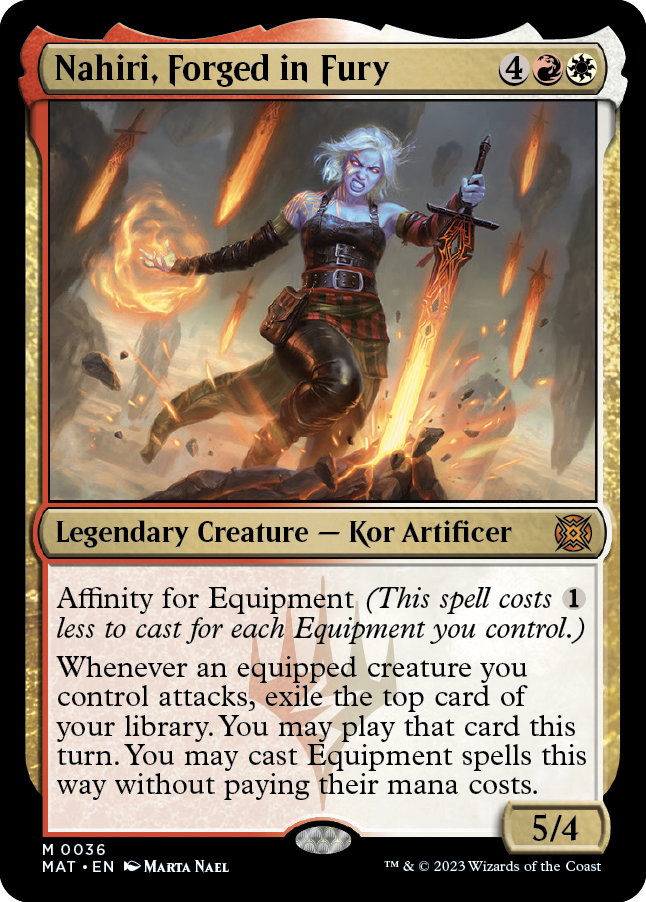
Nahiri, Forged in Fury
{4}{R}{W}
Legendary Creature — Kor Artificer
5/4
Affinity for Equipment (This spell costs {1} less to cast for each Equipment you control.)
Whenever an equipped creature you control attacks, exile the top card of your library. You may play that card this turn. You may cast Equipment spells this way without paying their mana costs.
- An "equipped creature you control" is any creature you control with one or more Equipment attached to it.
- Nahiri's last ability will trigger once for each equipped creature you control that attacks, no matter how many Equipment are attached to any of them.
- You may play the card exiled with Nahiri's ability even if Nahiri or the equipped creature leaves the battlefield or you lose control of them.
- Playing the exiled card follows the normal rules for playing that card. Unless you're casting an Equipment spell this way, you must pay the spell's costs, and you must follow all applicable timing rules. For example, if the card is a creature card, you can cast that card by paying its mana cost only during your main phase while the stack is empty.
- If you cast an Equipment spell this way, you may choose to pay its mana cost if you want to.
- One reason you might want to pay its mana cost is if there's an {X} in its mana cost. If you cast such a spell without paying its mana cost, you must choose 0 as the value of X. (If you pay its mana cost, you may choose the value of X as normal.)
- Unless an effect allows you to play additional lands that turn, you can play a land card exiled with Nahiri only if you haven't played a land yet that turn.
- If you don't play the card, it will remain exiled.
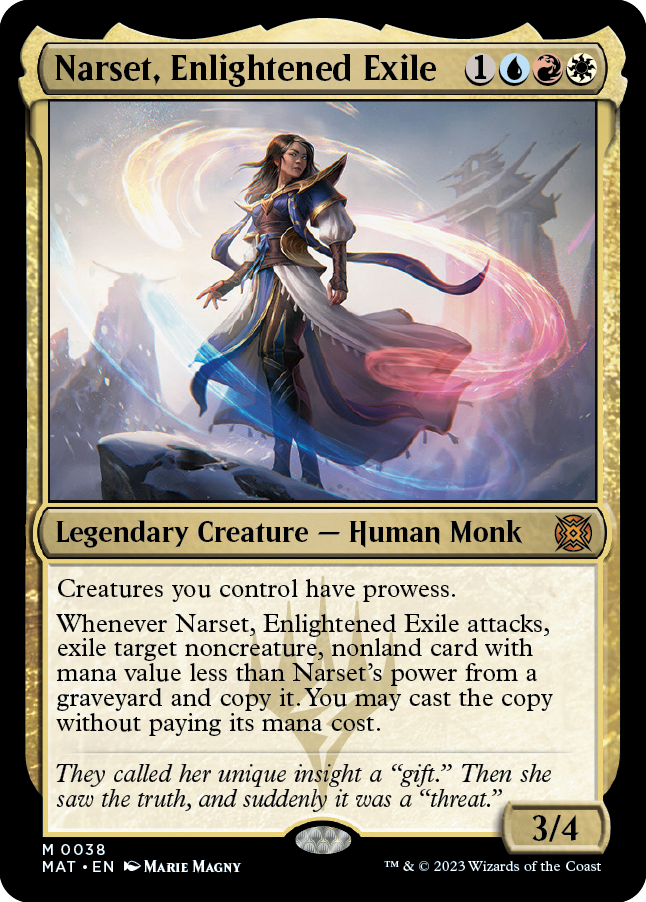
Narset, Enlightened Exile
{1}{U}{R}{W}
Legendary Creature — Human Monk
3/4
Creatures you control have prowess.
Whenever Narset, Enlightened Exile attacks, exile target noncreature, nonland card with mana value less than Narset's power from a graveyard and copy it. You may cast the copy without paying its mana cost.
- Narset's first ability gives it prowess while it's on the battlefield.
- Once a prowess ability triggers, causing the creature to lose prowess by removing Narset, Enlightened Exile won't affect that ability. The creature will still get +1/+1 until end of turn.
- If a creature has multiple instances of prowess, each triggers separately.
- You cast the copy while the ability is resolving and still on the stack. You can't wait to cast it later in the turn.
- If you cast a spell "without paying its mana cost," you can't pay any alternative costs. You can, however, pay additional costs, such as kicker costs. If the card has any mandatory additional costs, you must pay those.
- If the spell you cast has {X} in its mana cost, you must choose 0 as the value of X.
- If you don't want to cast the copy, you can choose not to; the copy ceases to exist the next time state-based actions are performed.
- If another effect causes Narset's power to be less than or equal to the mana value of the target card as the ability tries to resolve, the target is illegal. The card won't be exiled, and you won't get to cast a copy.
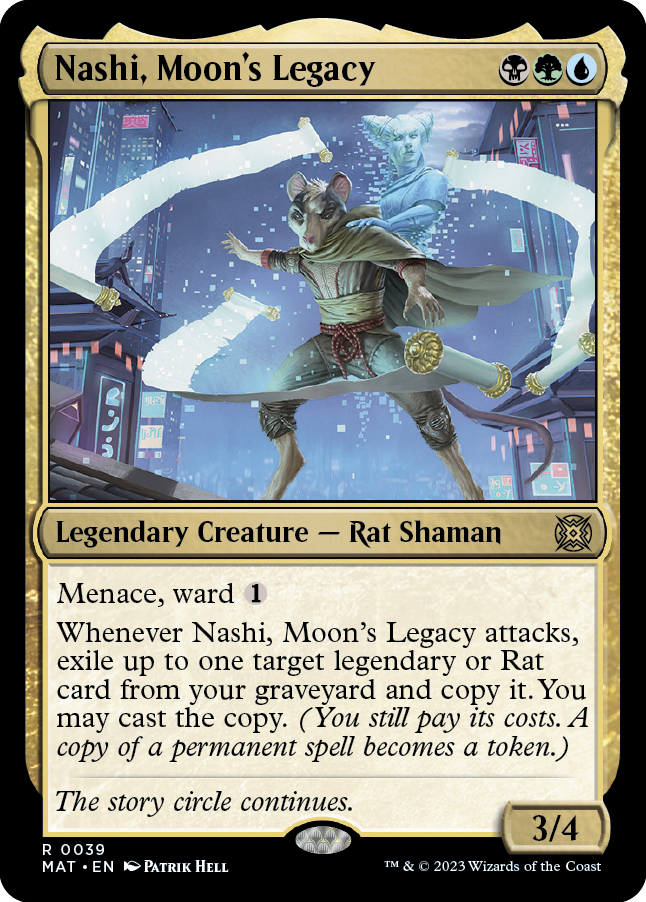
Nashi, Moon's Legacy
{B}{G}{U}
Legendary Creature — Rat Shaman
3/4
Menace, ward {1}
Whenever Nashi, Moon's Legacy attacks, exile up to one target legendary or Rat card from your graveyard and copy it. You may cast the copy. (You still pay its costs. A copy of a permanent spell becomes a token.)
- You cast the copy while the ability is resolving and still on the stack. You can't wait to cast it later in the turn.
- Because you're paying the spell's costs, if the spell has {X} in its mana cost, you may choose its value as normal.
- If you don't want to cast the copy, you can choose not to; the copy ceases to exist the next time state-based actions are performed.
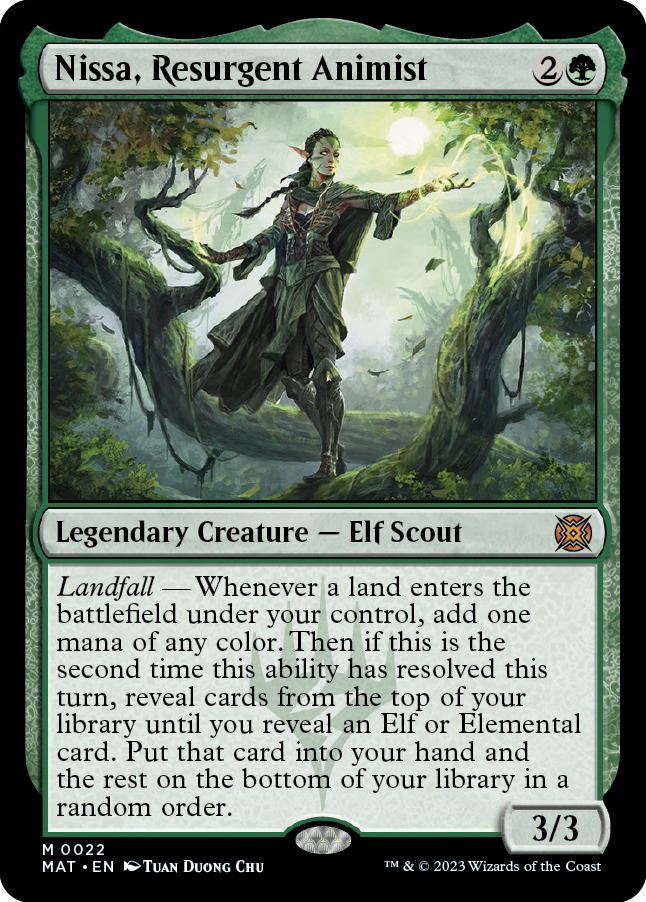
Nissa, Resurgent Animist
{2}{G}
Legendary Creature — Elf Scout
3/3
Landfall — Whenever a land enters the battlefield under your control, add one mana of any color. Then if this is the second time this ability has resolved this turn, reveal cards from the top of your library until you reveal an Elf or Elemental card. Put that card into your hand and the rest on the bottom of your library in a random order.
- Nissa's landfall ability isn't a mana ability, even though it causes you to add mana. It uses the stack and can be responded to.
- Each time the landfall ability resolves in a turn after the second time, you'll just add mana.
- If you reveal your entire library and don't reveal an Elf or Elemental card, you'll put all revealed cards back in a random order. This uses the same physical action as shuffling, although it isn't technically a "shuffle."
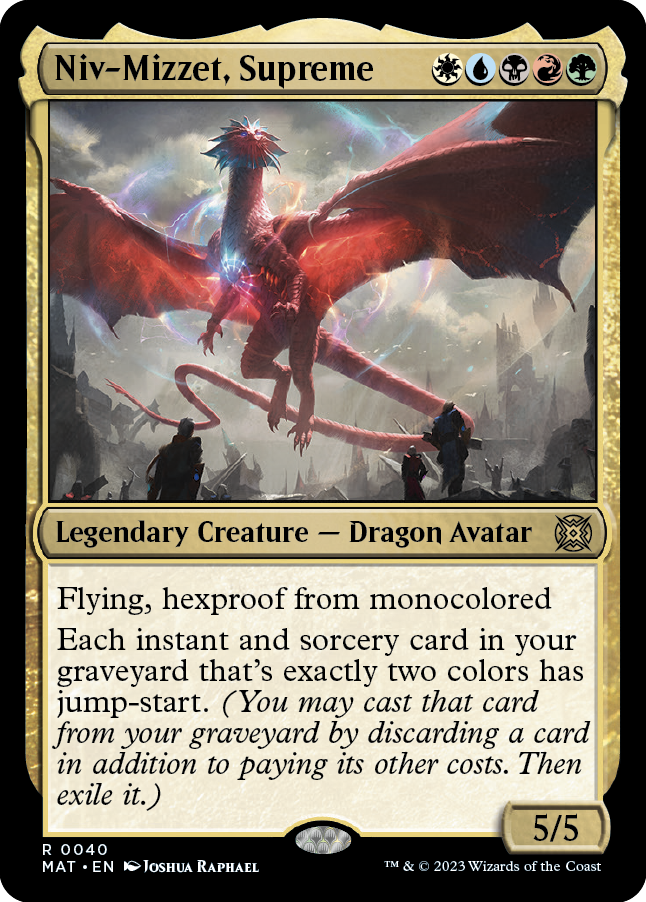
Niv-Mizzet, Supreme
{W}{U}{B}{R}{G}
Legendary Creature — Dragon Avatar
5/5
Flying, hexproof from monocolored
Each instant and sorcery card in your graveyard that's exactly two colors has jump-start. (You may cast that card from your graveyard by discarding a card in addition to paying its other costs. Then exile it.)
Jump-start general notes:
- You must still follow any timing restrictions and permissions, including those based on the card's type. For instance, you can cast a sorcery using jump-start only when you could normally cast a sorcery.
- A spell cast using jump-start will always be exiled afterward, whether it resolves, it's countered, or it leaves the stack in some other way.
- If an effect allows you to pay an alternative cost rather than a spell's mana cost, you may pay that alternative cost when you jump-start a spell. You'll still discard a card as an additional cost to cast it.
- If an instant or sorcery card is put into your graveyard during your turn, you'll be able to cast it right away if it's legal to do so, before any player may attempt to remove that card from your graveyard.
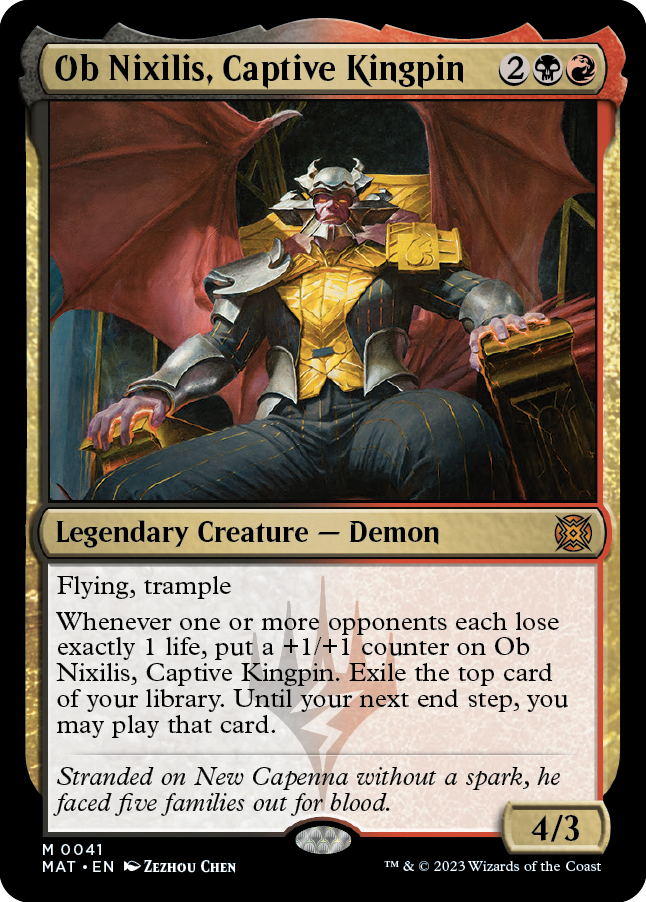
Ob Nixilis, Captive Kingpin
{2}{B}{R}
Legendary Creature — Demon
4/3
Flying, trample
Whenever one or more opponents each lose exactly 1 life, put a +1/+1 counter on Ob Nixilis, Captive Kingpin. Exile the top card of your library. Until your next end step, you may play that card.
- Ob Nixilis's last ability will trigger if an opponent is dealt exactly 1 damage, pays exactly 1 life, or loses exactly 1 life some other way.
- Ob Nixilis's last ability looks at all combat damage dealt to an opponent in total to determine whether it triggers. For example, if three 1/1 creatures deal combat damage to an opponent, that player loses 3 life. Ob Nixilis's ability won't trigger.
- You may play the card exiled with Ob Nixilis even if Ob Nixilis leaves the battlefield or you lose control of it.
- Playing the card exiled with Ob Nixilis follows the normal rules for playing that card. You must pay its costs, and you must follow all applicable timing rules. For example, if the card is a creature card, you can cast that card by paying its mana cost only during your main phase while the stack is empty.
- Unless an effect allows you to play additional lands that turn, you can play a land card exiled with Ob Nixilis only if you haven't played a land yet that turn.
- If you don't play the card, it will remain exiled.
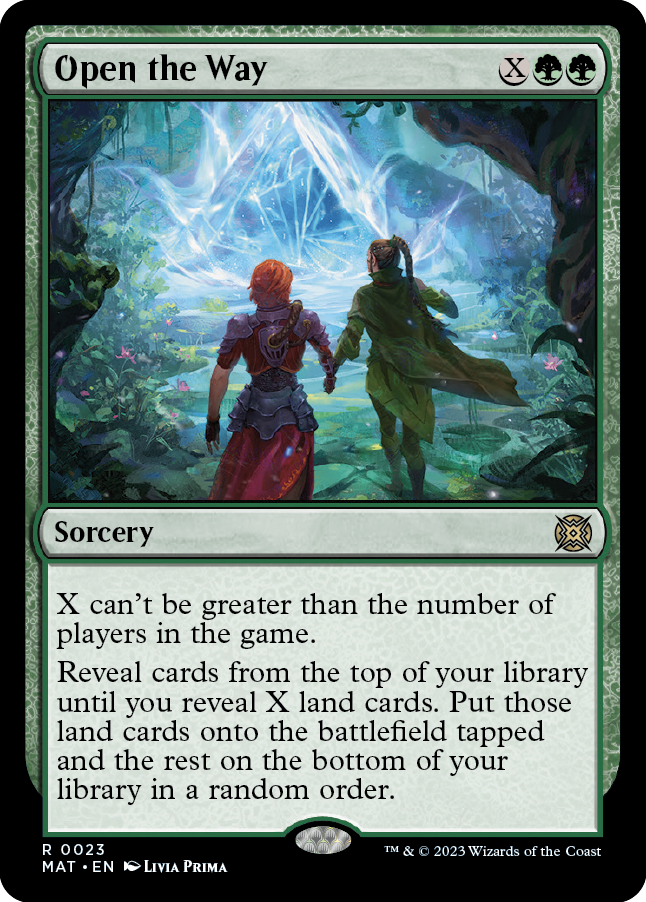
Open the Way
{X}{G}{G}
Sorcery
X can't be greater than the number of players in the game.
Reveal cards from the top of your library until you reveal X land cards. Put those land cards onto the battlefield tapped and the rest on the bottom of your library in a random order.
- The number of players in the game is checked only as you choose the value for X. Once you've cast Open the Way, players leaving the game in response to the spell won't affect the number of land cards you'll find.
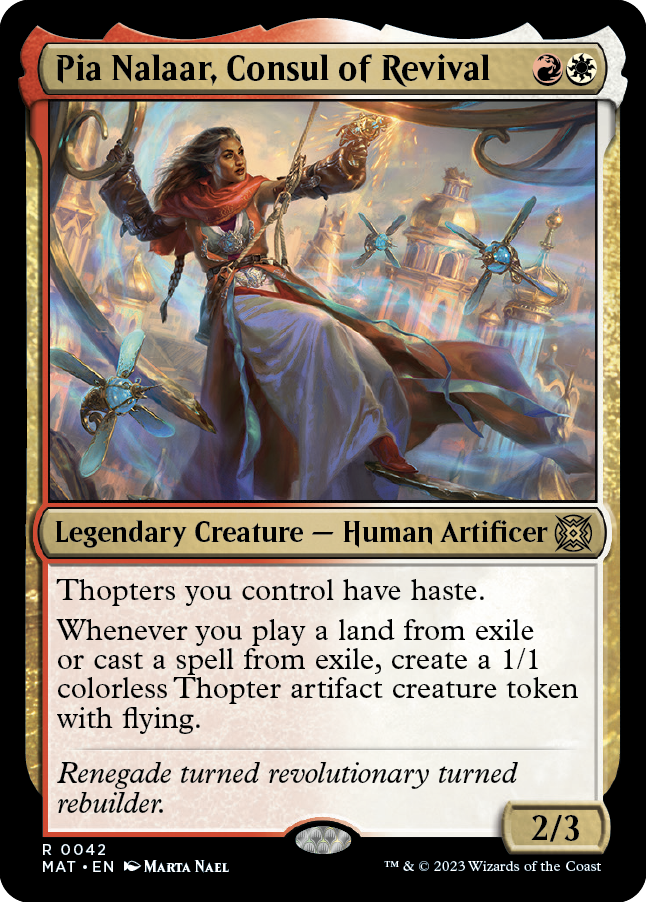
Pia Nalaar, Consul of Revival
{R}{W}
Legendary Creature — Human Artificer
2/3
Thopters you control have haste.
Whenever you play a land from exile or cast a spell from exile, create a 1/1 colorless Thopter artifact creature token with flying.
- Once a Thopter that came under your control this turn has legally attacked, causing it to lose haste by removing Pia Nalaar won't remove that Thopter from combat. It will just keep attacking. Good Thopter.
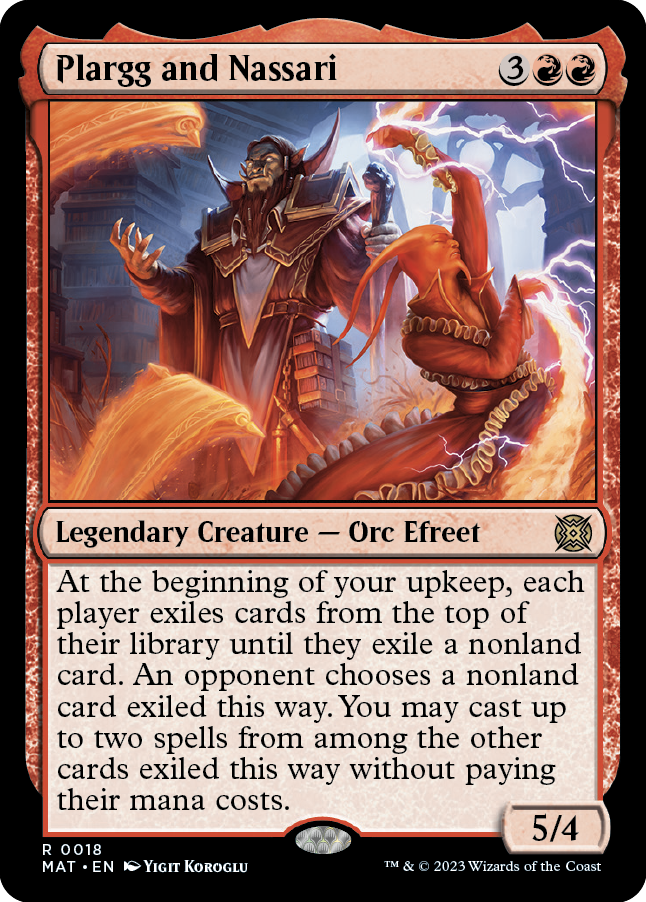
Plargg and Nassari
{3}{R}{R}
Legendary Creature — Orc Efreet
5/4
At the beginning of your upkeep, each player exiles cards from the top of their library until they exile a nonland card. An opponent chooses a nonland card exiled this way. You may cast up to two spells from among the other cards exiled this way without paying their mana costs.
- In a multiplayer game, you choose an opponent to choose a nonland card exiled with Plargg and Nassari.
- In a two-player game, assuming each player eventually exiles a nonland card, your opponent will choose one of them, and you'll be able to cast the other one.
- All the spells you cast due to the triggered ability are cast during the resolution of that ability. You can cast them in any order.
- A spell you cast this way can be the target of a later spell you cast this way. However, permanent spells cast this way won't resolve until you're done casting spells, so the permanents they become can't be the target of spells cast this way. For example, if you exile Twincast and Lightning Strike, you can cast Lightning Strike and then cast Twincast targeting it, but if you exile a creature card and an Aura card, you can't cast that Aura targeting that creature.
- If you cast a spell "without paying its mana cost," you can't pay any alternative costs. You can, however, pay additional costs. If the spell has any mandatory additional costs, those must be paid to cast it.
- If a spell has {X} in its mana cost, you must choose 0 as the value of X when casting it without paying its mana cost.
- Cards not cast this way, including any land cards, remain in exile.
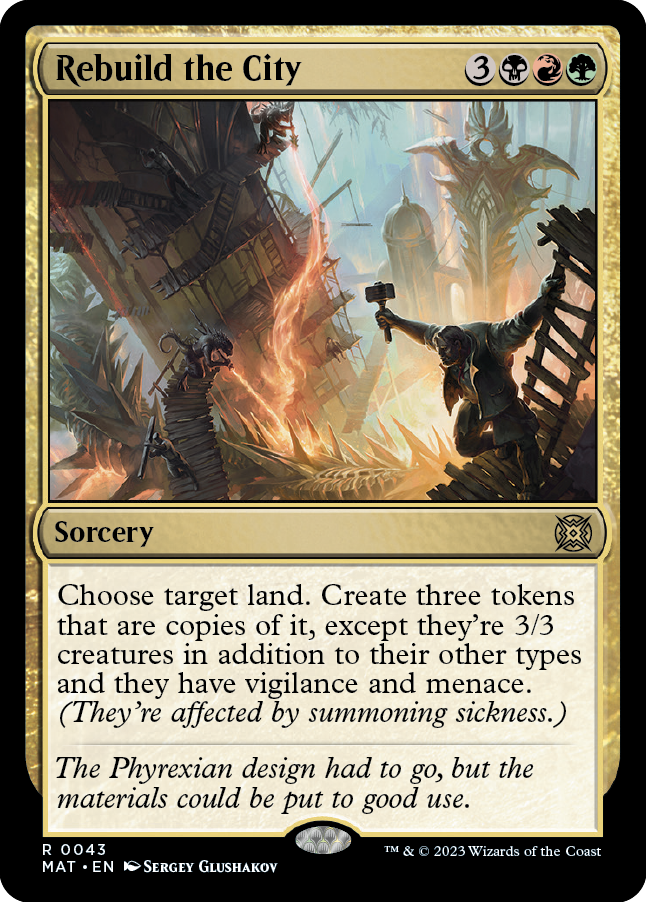
Rebuild the City
{3}{B}{R}{G}
Sorcery
Choose target land. Create three tokens that are copies of it, except they're 3/3 creatures in addition to their other types and they have vigilance and menace. (They're affected by summoning sickness.)
- Each of the tokens copy exactly what was printed on the original land and nothing else (unless that land is copying something else or is a token; see below). It doesn't copy whether that land is tapped or untapped, whether it has any counters on it or Auras and Equipment attached to it, or any non-copy effects that have changed its types, color, and so on. However, if the original land has an ability that says it enters the battlefield tapped, the copies will also enter tapped.
- If the copied land is a token, the token that's created copies the original characteristics of that token as stated by the effect that created that token.
- If the copied land is copying something else, then the token enters the battlefield as whatever that land copied.
- Any enters-the-battlefield abilities of the copied land will trigger when the token enters the battlefield. Any "as [this land] enters the battlefield" or "[this land] enters the battlefield with" abilities of the copied land will also work.
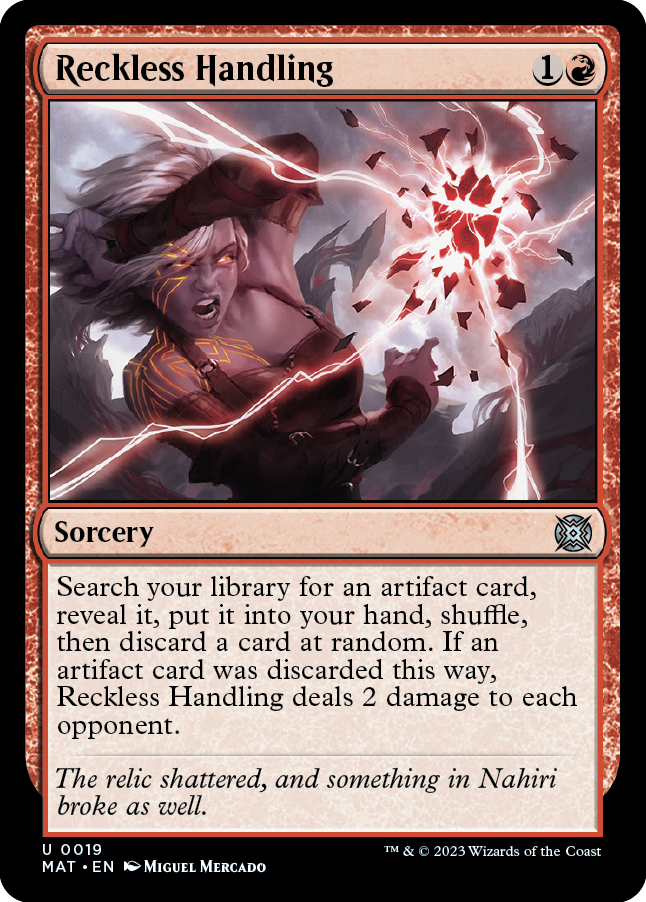
Reckless Handling
{1}{R}
Sorcery
Search your library for an artifact card, reveal it, put it into your hand, shuffle, then discard a card at random. If an artifact card was discarded this way, Reckless Handling deals 2 damage to each opponent.
- You can't do anything between putting the artifact card you found in your hand and discarding. You may end up discarding that card. But hey, if you do, 2 damage!
- You discard a card at random even if you didn't find an artifact card in your library.
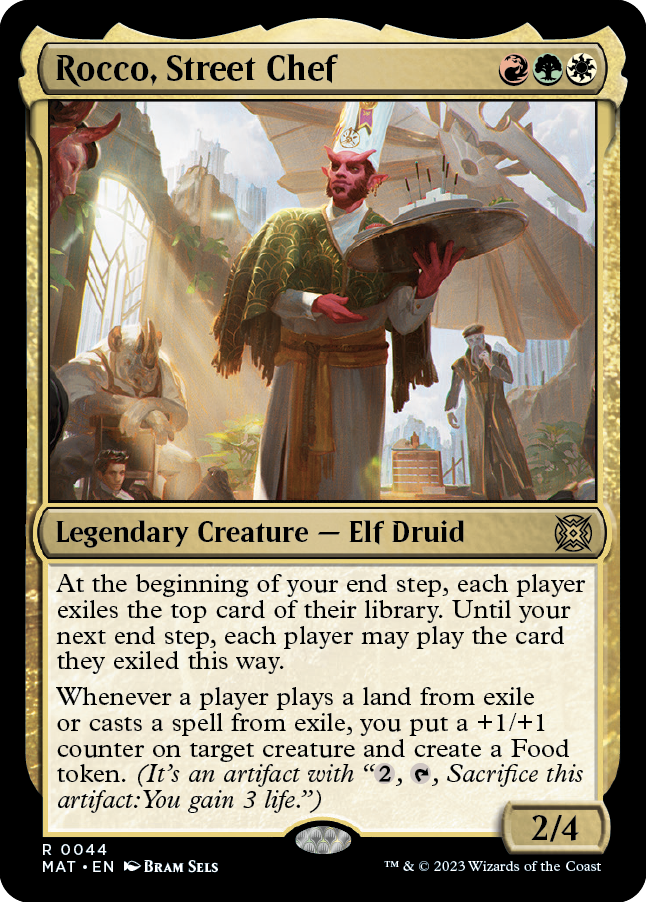
Rocco, Street Chef
{R}{G}{W}
Legendary Creature — Elf Druid
2/4
At the beginning of your end step, each player exiles the top card of their library. Until your next end step, each player may play the card they exiled this way.
Whenever a player plays a land from exile or casts a spell from exile, you put a +1/+1 counter on target creature and create a Food token. (It's an artifact with "{2}, {T}, Sacrifice this artifact: You gain 3 life.")
- If Rocco's last ability triggers because a spell was cast, that ability will resolve before that spell does. If the ability triggers because a land was played, the land will be on the battlefield by the time you put the ability on the stack. If the land entering the battlefield causes any triggered abilities to trigger, those abilities and Rocco's ability will be put on the stack at the same time, with the abilities controlled by the player whose turn it is going on the stack first (and thus resolving last).
- A player may play the card they exiled with Rocco even if Rocco leaves the battlefield before the duration expires.
- Playing the card you exiled with Rocco follows the normal rules for playing that card. You must pay its costs, and you must follow all applicable timing rules. For example, if the card is a creature card, you can cast that card by paying its mana cost only during your main phase while the stack is empty.
- Unless an effect allows you to play additional lands that turn, you can play a land card you exiled with Rocco only if you haven't played a land yet that turn.
- All cards not played remain exiled.
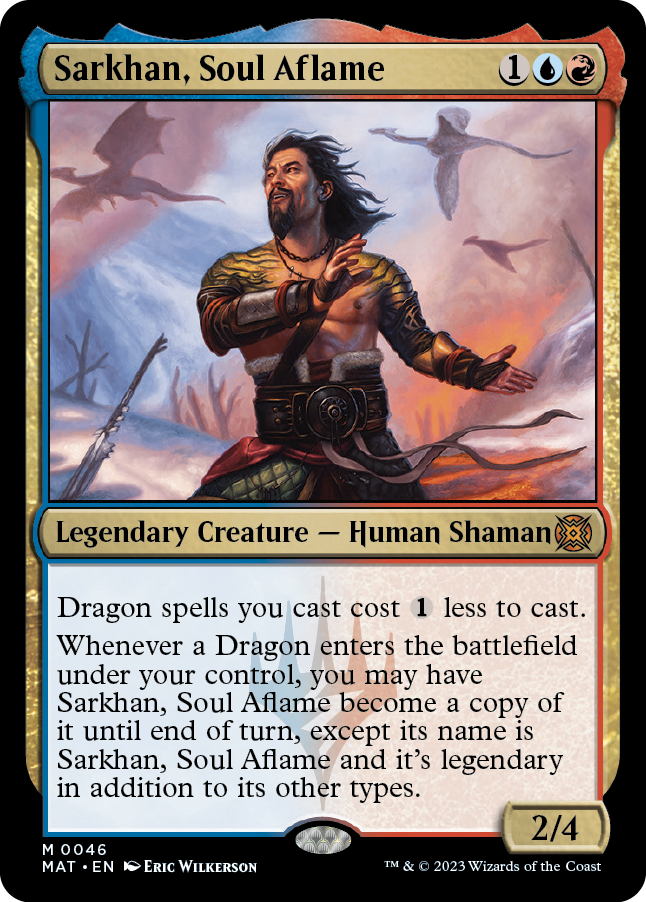
Sarkhan, Soul Aflame
{1}{U}{R}
Legendary Creature — Human Shaman
2/4
Dragon spells you cast cost {1} less to cast.
Whenever a Dragon enters the battlefield under your control, you may have Sarkhan, Soul Aflame become a copy of it until end of turn, except its name is Sarkhan, Soul Aflame and it's legendary in addition to its other types.
- Sarkhan's first ability doesn't change the mana cost or mana value of any Dragon spell. It changes only the total cost you pay.
- That ability can't reduce the amount of colored mana you pay for a Dragon spell. It reduces only the generic component of that cost.
- Sarkhan copies exactly what was printed on the original Dragon and nothing else, with the noted exceptions (unless that creature is a token; see below). It doesn't copy whether that creature is tapped or untapped, whether it has any counters on it or Auras and Equipment attached to it, or any non-copy effects that have changed its power, toughness, types, color, and so on in response to Sarkhan's ability.
- If the copied Dragon has {X} in its mana cost, X is 0.
- If the copied Dragon is a token, Sarkhan copies the original characteristics of that token as stated by the effect that created that token, with the noted exceptions.
- In some unusual cases, the Dragon that entered the battlefield will be copying something else by the time Sarkhan's ability resolves. In such a case, Sarkhan will copy whatever the Dragon is copying, with the noted exceptions.
- If the Dragon that enters the battlefield is legendary and you have Sarkhan copy it, the two Dragons will have different names (unless the entering Dragon is somehow named Sarkhan, Soul Aflame). The "legend rule" won't apply.
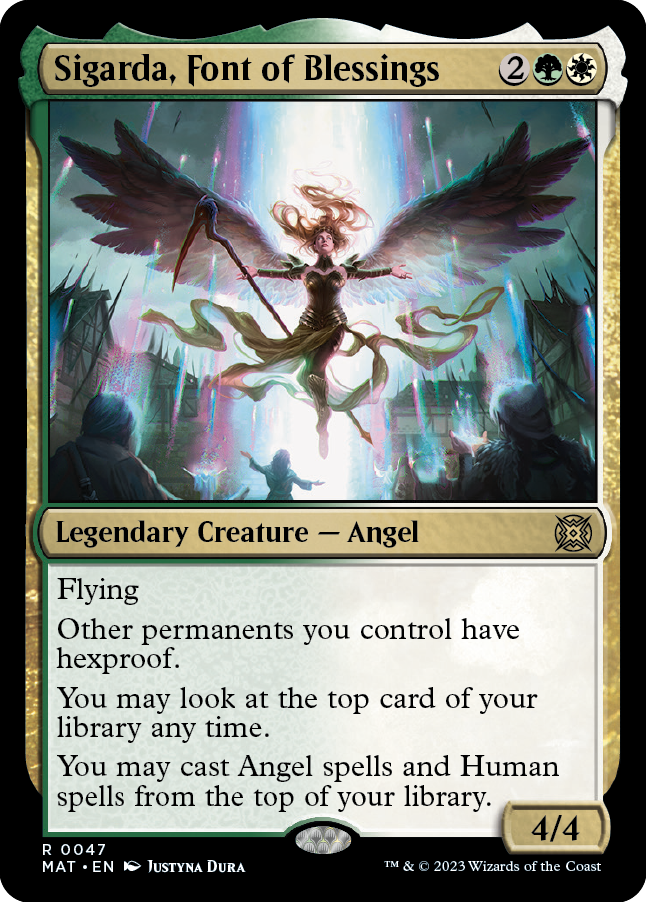
Sigarda, Font of Blessings
{2}{G}{W}
Legendary Creature — Angel
4/4
Flying
Other permanents you control have hexproof.
You may look at the top card of your library any time.
You may cast Angel spells and Human spells from the top of your library.
- Sigarda lets you look at the top card of your library whenever you want (with one restriction—see below), even if you don't have priority. This action doesn't use the stack. Knowing what that card is becomes part of the information you have access to, just like you can look at the cards in your hand.
- If the top card of your library changes while you're casting a spell, playing a land, or activating an ability, you can't look at the new top card until you finish doing so. This means that if you cast the top card of your library, you can't look at the next one until you're done paying for that spell.
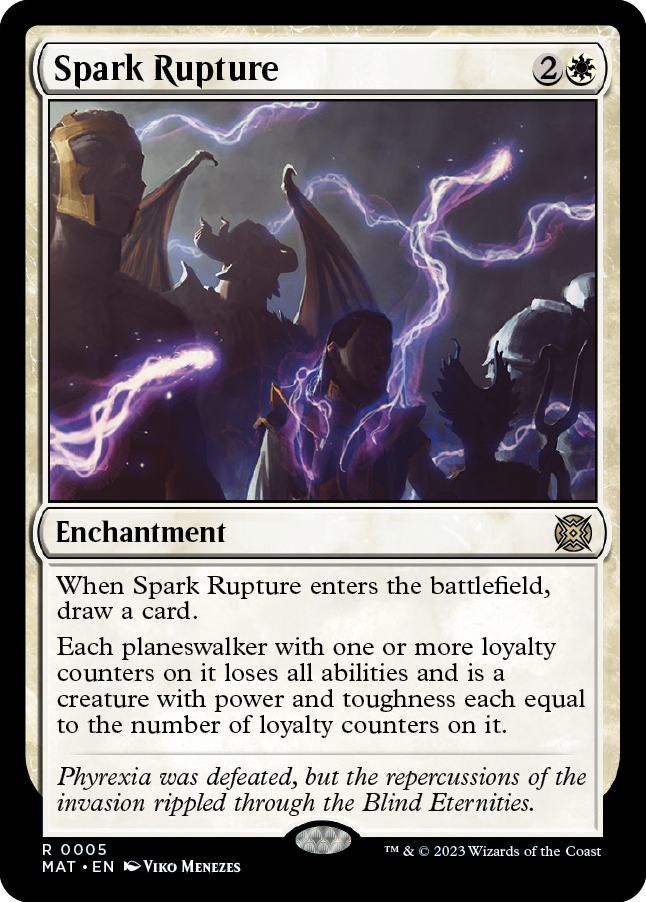
Spark Rupture
{2}{W}
Enchantment
When Spark Rupture enters the battlefield, draw a card.
Each planeswalker with one or more loyalty counters on it loses all abilities and is a creature with power and toughness each equal to the number of loyalty counters on it.
- A planeswalker that becomes a creature due to Spark Rupture is no longer a planeswalker. It can no longer be attacked, and damage dealt to it won't cause it to lose loyalty counters.
- A planeswalker affected by Spark Rupture loses all abilities it has, not only loyalty abilities. The resulting creature may gain abilities after Spark Rupture enters the battlefield.
- While Spark Rupture is on the battlefield, planeswalkers will enter the battlefield as creatures, but with the appropriate number of loyalty counters. For example, a planeswalker that normally enters with three loyalty counters on it will enter as a 3/3 creature and have three loyalty counters on it.
- The resulting creature's power and toughness will change if the number of loyalty counters on it changes.
- If a planeswalker-turned-creature has all loyalty counters removed from it, Spark Rupture's effect will stop applying to it. It will momentarily return to being a planeswalker, but as it has no loyalty counters, it will soon find itself in the graveyard. If this happens, you won't have priority to activate any of its loyalty abilities before the planeswalker is put into its owner's graveyard.
- In some unusual cases, Spark Rupture may enter the battlefield during a combat in which a planeswalker has been attacked. In such a case, that planeswalker will be removed from combat. If blockers haven't been declared yet, the resulting creature may block. Creatures that were attacking that planeswalker remain attacking and can be blocked, but they won't deal combat damage if unblocked.
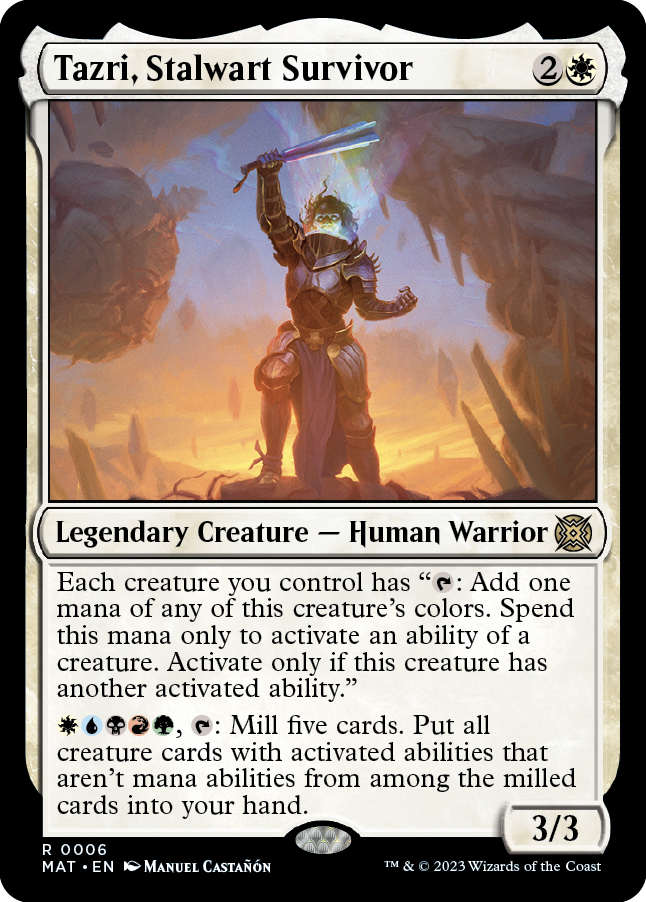
Tazri, Stalwart Survivor
{2}{W}
Legendary Creature — Human Warrior
3/3
Each creature you control has "{T}: Add one mana of any of this creature's colors. Spend this mana only to activate an ability of a creature. Activate only if this creature has another activated ability."
{W}{U}{B}{R}{G}, {T}: Mill five cards. Put all creature cards with activated abilities that aren't mana abilities from among the milled cards into your hand.
- The mana produced by the ability granted by Tazri's first ability may be spent only to activate an ability of a creature on the battlefield. It can't be spent to activate abilities of creature cards in other zones.
- The other activated ability the creature must have can be any activated ability, including one that can't be activated at the moment, or even one that can't be activated while the creature is on the battlefield. For example, you could tap a creature with cycling and Tazri's ability for mana.
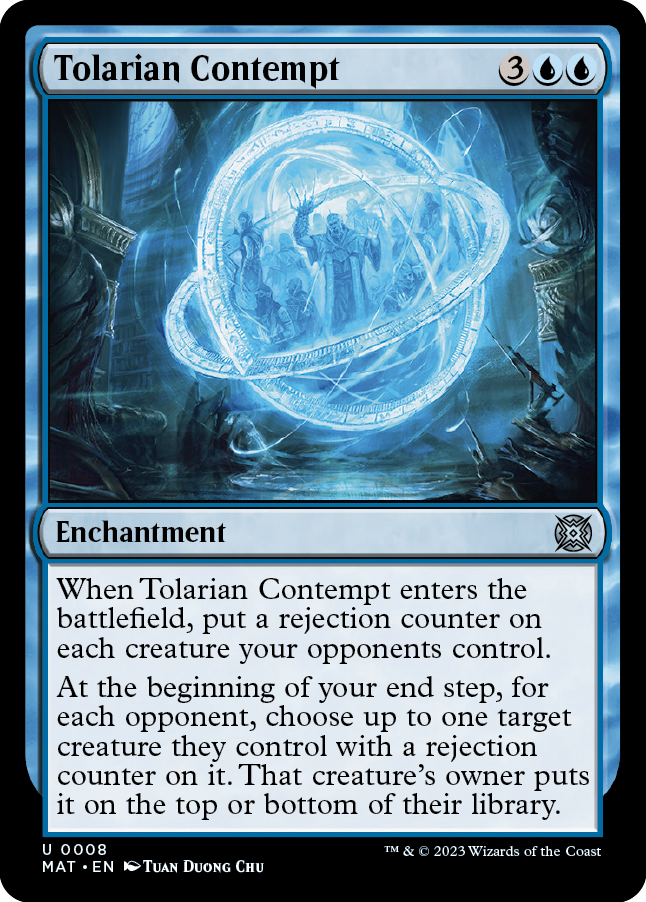
Tolarian Contempt
{3}{U}{U}
Enchantment
When Tolarian Contempt enters the battlefield, put a rejection counter on each creature your opponents control.
At the beginning of your end step, for each opponent, choose up to one target creature they control with a rejection counter on it. That creature's owner puts it on the top or bottom of their library.
- Each affected creature's owner chooses whether to put it on the top or bottom of their library.
- Every player gets to know whether a card is going to the top or bottom of any library.
- However, if a player ends up putting multiple cards on top of their library or on the bottom of their library, either because a creature they owned but didn't control was rejected along with one they controlled or a rejected creature they owned was comprised of multiple cards (e.g. a mutated or melded permanent), other players don't get to know the relative order of those cards.
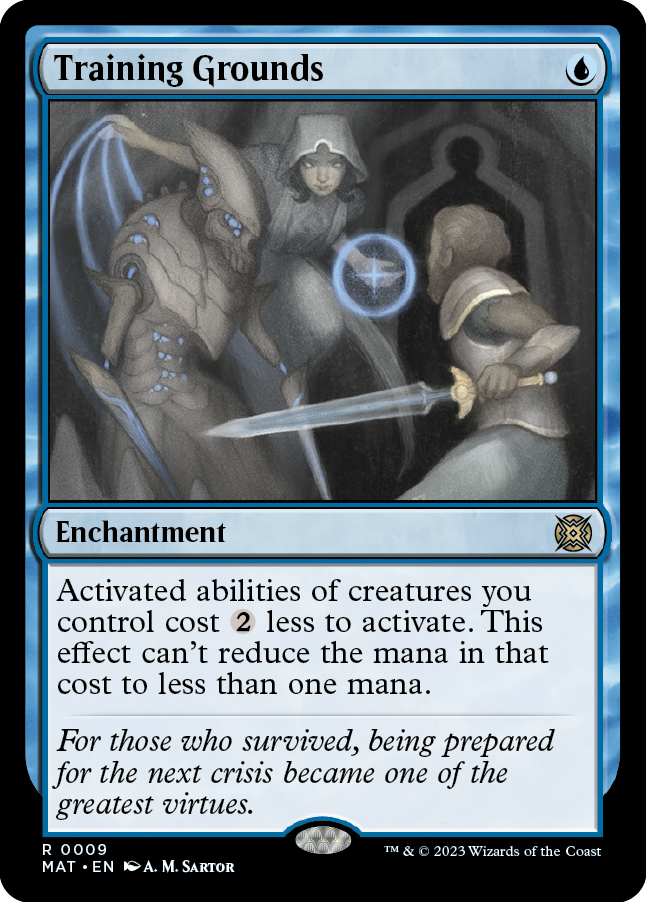
Training Grounds
{U}
Enchantment
Activated abilities of creatures you control cost {2} less to activate. This effect can't reduce the mana in that cost to less than one mana.
- Training Grounds affects only creatures you control on the battlefield. The costs of activated abilities that work in other zones (such as cycling or unearth) won't be reduced.
- Training Grounds won't affect the part of an activation cost represented by colored mana symbols or snow mana symbols. It also won't affect nonmana parts of an activation cost, if there are any.
- Training Grounds can reduce the part of an activation cost represented by generic mana symbols down to nothing, as long as it still costs at least one mana. For example, if an activation cost is {2}{G}, you'd have to pay only {G}. If an activation cost is {2}, though, you'd still have to pay {1}.
- Training Grounds can reduce the amount you pay for a creature's activated ability cost that includes {X}. For example, Drana, Kalastria Bloodchief has an activated ability that costs {X}{B}{B}. If you control Training Grounds and you activate the ability with X equal to 5, you'll have to pay only {3}{B}{B}. This is true even if the ability states that {X} must be paid with a certain color of mana, as Crimson Hellkite's ability does.
- If an activated ability of a creature you control costs no generic mana to activate (for example, if it costs {R}{R}, it costs {0}, or it costs only nonmana actions such as {T} or "Sacrifice a creature"), Training Grounds simply won't affect it. In particular, it won't increase the cost to include a mana payment of {1}.
- Training Grounds takes the total cost to activate a creature's activated ability into account, not just the cost printed on it. For example, Urabrask has an activated ability that costs {R}, and Suppression Field says "Activated abilities cost {2} more to activate unless they're mana abilities." Since activating Urabrask's activated ability would now cost {2}{R}, Training Grounds reduces that cost back to {R}.
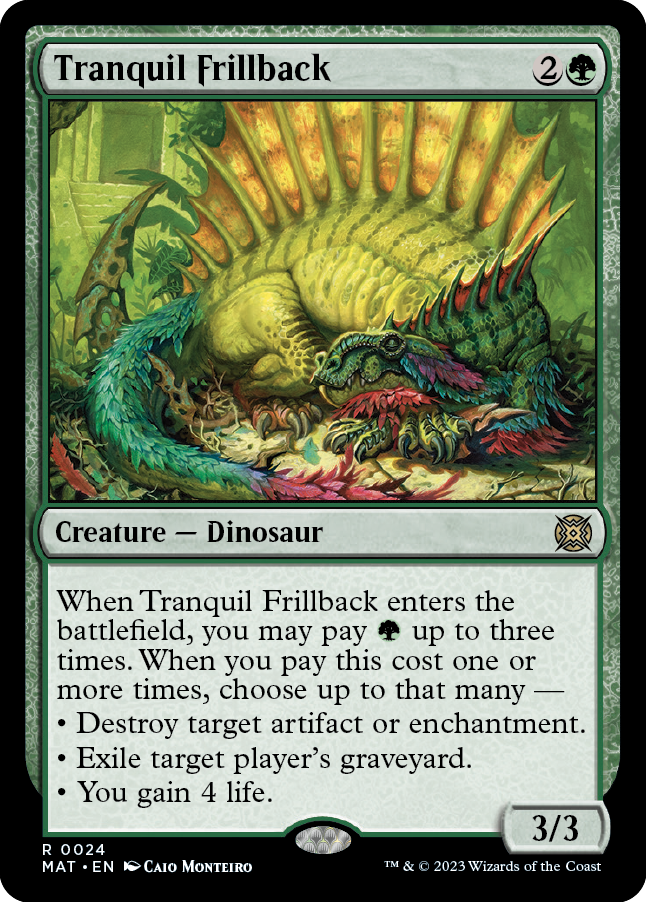
Tranquil Frillback
{2}{G}
Creature — Dinosaur
3/3
When Tranquil Frillback enters the battlefield, you may pay {G} up to three times. When you pay this cost one or more times, choose up to that many —
• Destroy target artifact or enchantment.
• Exile target player's graveyard.
• You gain 4 life.
- Tranquil Frillback's triggered ability goes on the stack with no targets and no modes chosen. As it resolves, you may pay {G} up to three times. That is, you may pay {G}, {G}{G}, {G}{G}{G}, or choose not to pay. If you chose to pay, the second "reflexive" triggered ability will trigger. You'll choose the modes and targets, if any, for that second ability at that time.
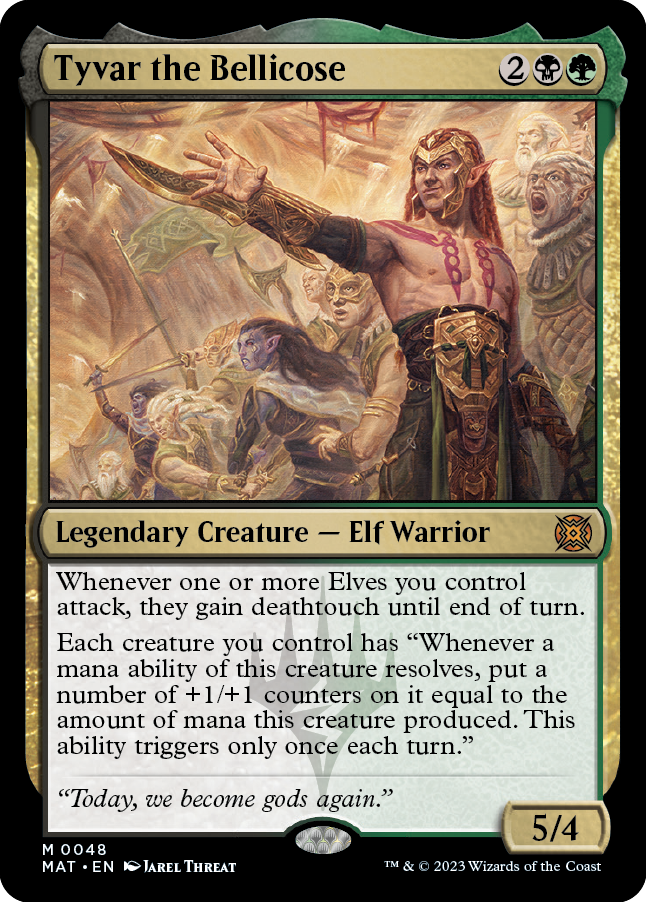
Tyvar the Bellicose
{2}{B}{G}
Legendary Creature — Elf Warrior
5/4
Whenever one or more Elves you control attack, they gain deathtouch until end of turn.
Each creature you control has "Whenever a mana ability of this creature resolves, put a number of +1/+1 counters on it equal to the amount of mana this creature produced. This ability triggers only once each turn."
- The ability that Tyvar grants to each creature you control functions independently for each creature. Specifically, the ability can trigger once each turn for each creature you control, not just once total.
- If the mana ability that caused the granted triggered ability to trigger was activated while casting a spell or activating an ability, the triggered ability will resolve (and +1/+1 counters will be added) before that spell or ability.
- If Tyvar leaves the battlefield and returns to the battlefield in the same turn, or if Tyvar leaves and another Tyvar appears, the triggered ability granted by the new one is different than the triggered ability granted by the old one. The one granted by the new Tyvar may trigger for each creature you control, even if the ability granted by the old Tyvar triggered for those creatures that turn. (Note that creatures you control won't have the ability granted by the old one anymore, and if you control multiple Tyvars, you won't have the opportunity to activate mana abilities before the "legend rule" gets you down to one Tyvar.)
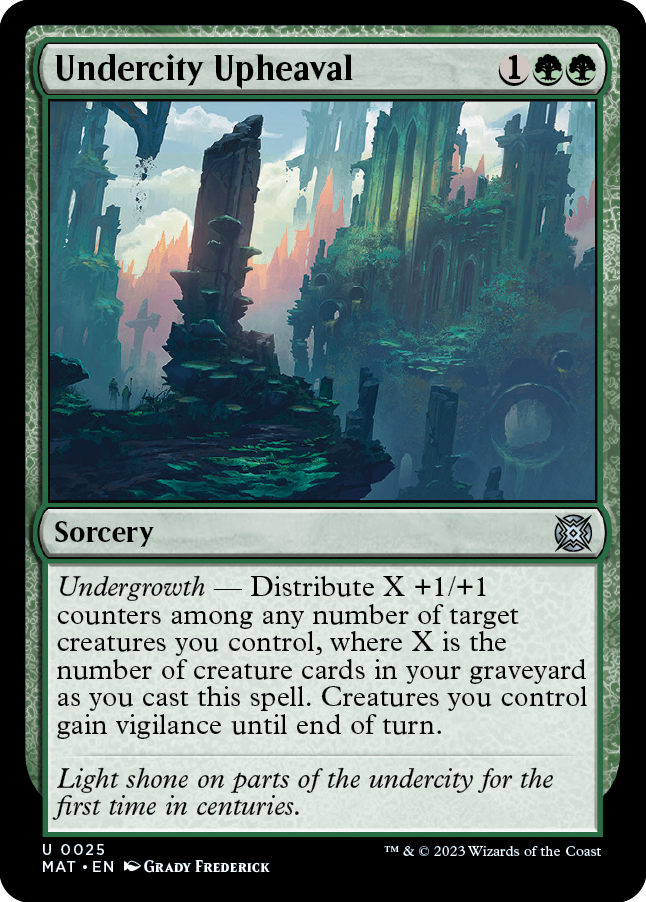
Undercity Upheaval
{1}{G}{G}
Sorcery
Undergrowth — Distribute X +1/+1 counters among any number of target creatures you control, where X is the number of creature cards in your graveyard as you cast this spell. Creatures you control gain vigilance until end of turn.
- You choose how many targets Undercity Upheaval has and how the counters will be distributed as you cast the spell. Each target must receive at least one counter.
- If some of the creatures are illegal targets as Undercity Upheaval tries to resolve, the original distribution of counters still applies and the counters that would have been put on the illegal targets are lost. They won't be put instead on a legal target.
- If all of Undercity Upheaval's targets are illegal at the time the spell tries to resolve, it won't resolve and none of its effects will happen. Creatures you control won't gain vigilance.
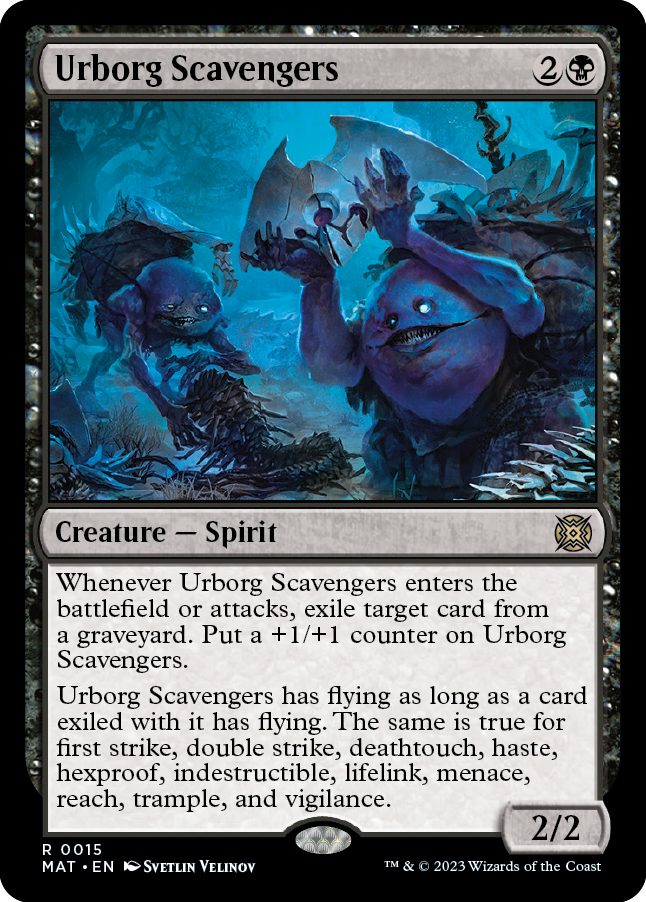
Urborg Scavengers
{2}{B}
Creature — Spirit
2/2
Whenever Urborg Scavengers enters the battlefield or attacks, exile target card from a graveyard. Put a +1/+1 counter on Urborg Scavengers.
Urborg Scavengers has flying as long as a card exiled with it has flying. The same is true for first strike, double strike, deathtouch, haste, hexproof, indestructible, lifelink, menace, reach, trample, and vigilance.
- If the target of the first ability is an illegal target at the time the ability tries to resolve (likely because it left the graveyard in response), the ability won't resolve and none of its effects will happen. You won't put a +1/+1 counter on Urborg Scavengers.
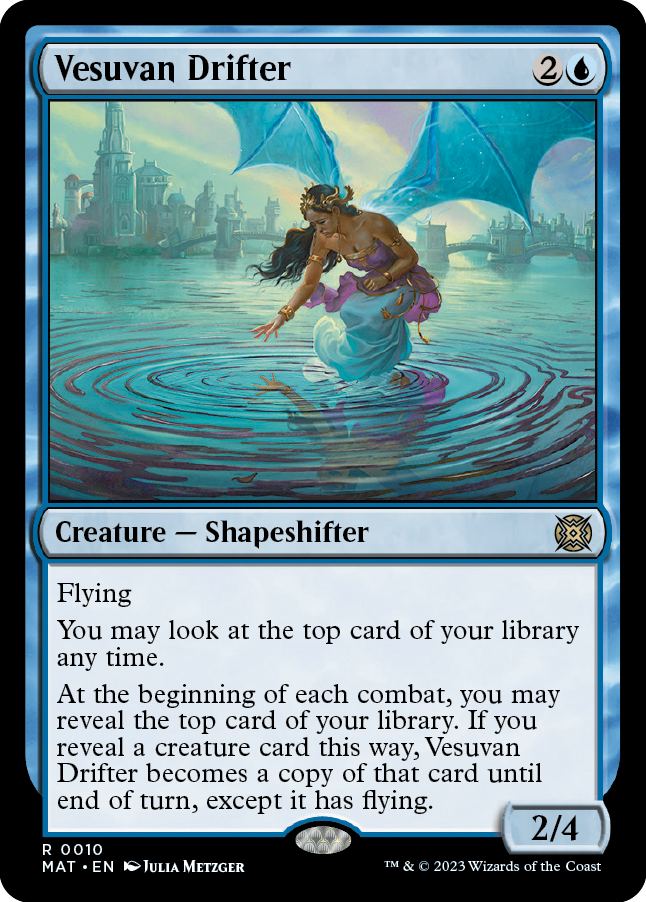
Vesuvan Drifter
{2}{U}
Creature — Shapeshifter
2/4
Flying
You may look at the top card of your library any time.
At the beginning of each combat, you may reveal the top card of your library. If you reveal a creature card this way, Vesuvan Drifter becomes a copy of that card until end of turn, except it has flying.
- Vesuvan Drifter lets you look at the top card of your library whenever you want (with one restriction—see below), even if you don't have priority. This action doesn't use the stack. Knowing what that card is becomes part of the information you have access to, just like you can look at the cards in your hand.
- If the top card of your library changes while you're casting a spell, playing a land, or activating an ability, you can't look at the new top card until you finish doing so. This means that if you cast the top card of your library, you can't look at the next one until you're done paying for that spell.
- Notably, while Vesuvan Drifter is a copy of another card, it doesn't have its own abilities. You won't be able to look at the top card of your library unless another effect allows you to do so.
- Vesuvan Drifter copies exactly what was printed on the original creature card and nothing else, except it has flying.
- If the copied creature card has {X} in its mana cost, X is 0.
- Any non-copy effect that began to apply to Vesuvan Drifter before it became a copy of a creature card will continue to apply to it after it becomes a copy. Auras and Equipment attached to Vesuvan Drifter will continue to work, as well as counters that change its power and toughness.
Magic: The Gathering, Magic, Innistrad, Kamigawa, New Capenna, Dominaria, The Brothers' War, and Phyrexia are trademarks of Wizards of the Coast LLC in the USA and other countries. ©2023 Wizards.

